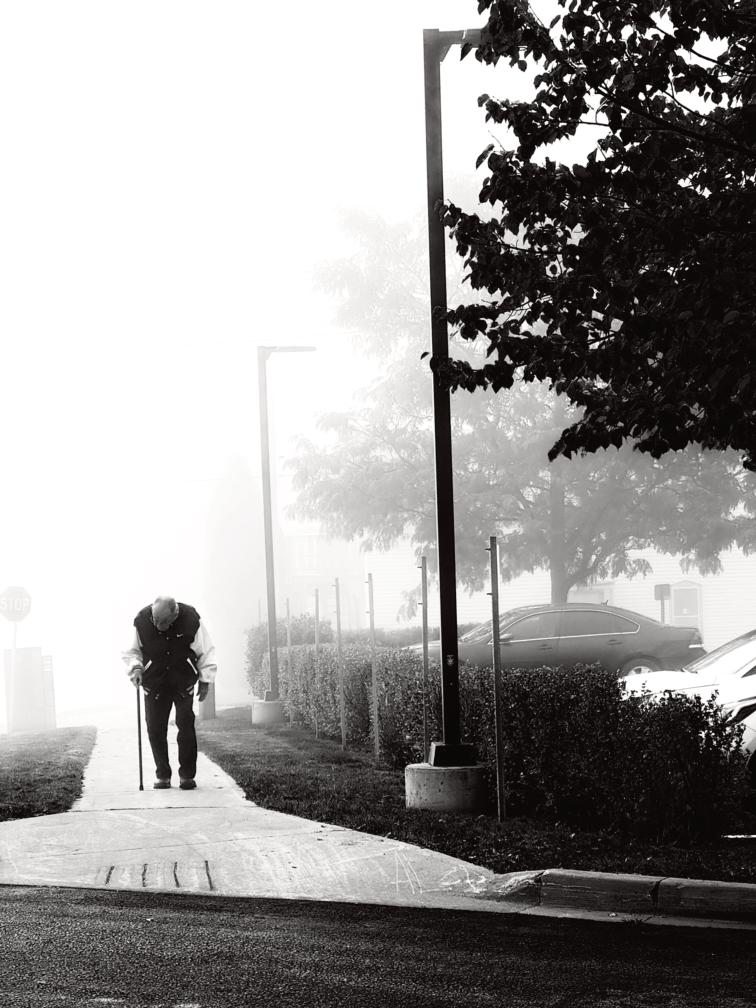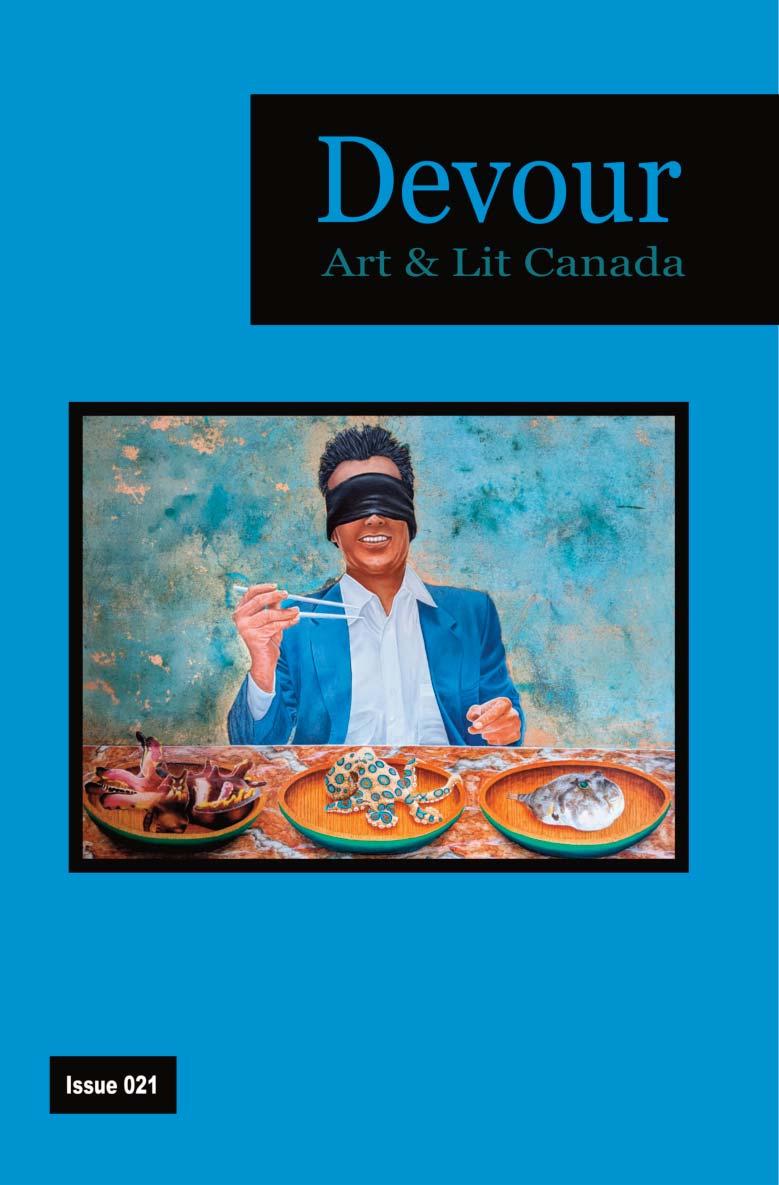




Find some of Canada’s finest authors, photographers and artists featured in every issue.
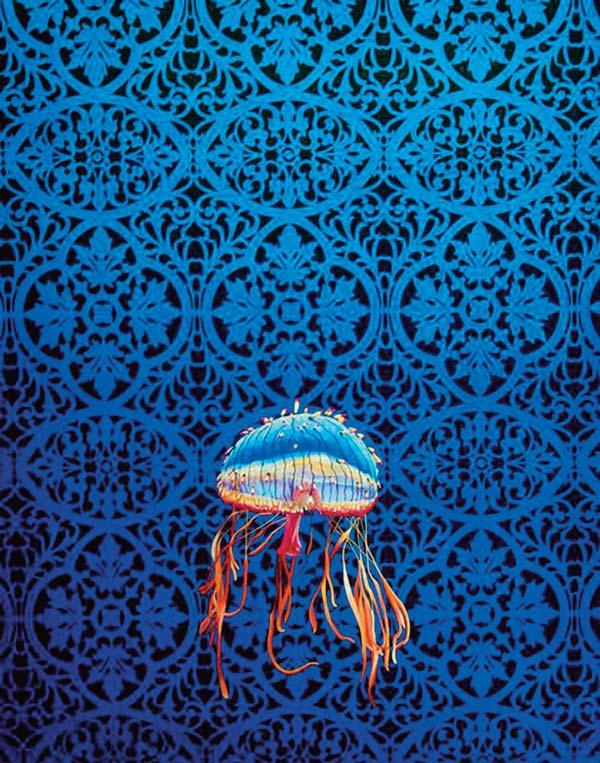
is to promote Canadian culture by bringing world-wide readers some of the best Canadian literature, art and photography.
Devour: Art and Lit Canada
ISSN 2561-1321
Issue 021
Summer 2025
5 Greystone Walk Drive Unit 408
Toronto, Ontario, Canada, M1K 5J5
DevourArtAndLitCanada@gmail.com
Poetry Editor – Bruce Kauffman
Review Editor – Shane Joseph
Prose Editor – Brian Moore
Photography Curator – Mike Gaudaur
Feature Photographer – Bob House
Editor-in-Chief – Richard M. Grove
Layout and Design – Richard M. Grove
Dear Readers:
Welcome to this 21th issue of Devour: Art & Lit Canada. As usual we are bringing you some of Canada’s most talented writers, poets and photographers.
As always, thank you to our ongoing faithful section editors. In no special order, thanks to Brian Moore, Bruce Kauffman, Shane Joseph and Mike Gaudaur. Thankyou to all of the contributors that make Devour a success.
We hope you will let not only your Canadian but also your international readers, family, and friends know about this all-Canadian magazine. See you between the pages.
Richard M. Grove otherwise known to friends as Tai.
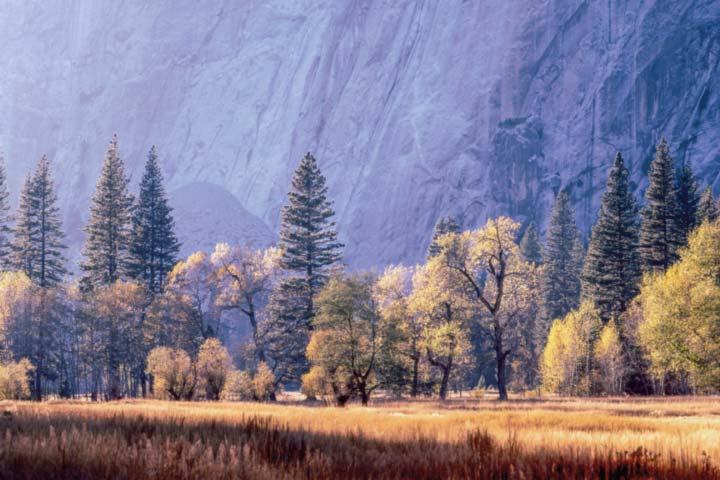
– Canada Coast to Coast to Coast – Photography Curator –Mike Gaudaur – p. 8–13, 49, 50, 51, Back Cover
– Feature Photographer – Bob House – p. 6, 14–19
– Canada in Review – Editor – Shane Joseph and Reviews – p. 20–31
– Poetry Canada – Editor – Bruce Kauffman, Poems and Pics – p. 32–79
– Photographs by Anna Di Nardo – p. 80–85
– Surrealism at its Satirical Best: : Bob ‘Omar’ Tunnoch , Artist / Musician / Songwriter – Essay by Richard M. Grove – Front Cover, p. 4, 86–91
– CanLit Essays on CanLit Authors
– A Miguel Ángel Olivé Iglesias review essay on: CanLit Poet John B. Lee in a Few Pages – p. 92–96
– A Richard M. Grove review essay on: FourSquare Poems by James Deahl – p. 97–103
– A Brian Way review essay on: And One for All by Hans David Müller – p. 104–108
– A Anna Mutala review on: The Ventara Adventures by Hans David Müller – p. 109
– A Richard M. Grove review essay on: Scar Atlas by Colin Morton – p. 110–113
– Canada in Prose – Prose Curator – Brian Moore – p. 114 – Story Heights by Mathea Treslan – p. 115–120
Photography Curator Mike Gaudaur
After more than four decades of making images that show what something looks like, I am gradually shifting towards making images that show more of what things feel like. I find that the images I capture are more graphic and minimalist. However, I think it is my processing of images that is changing even more. I am less concerned about ensuring that every little detail is clear and sharp, and more concerned about enhancing a mood and

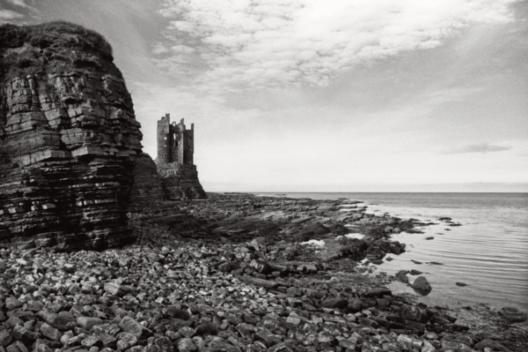
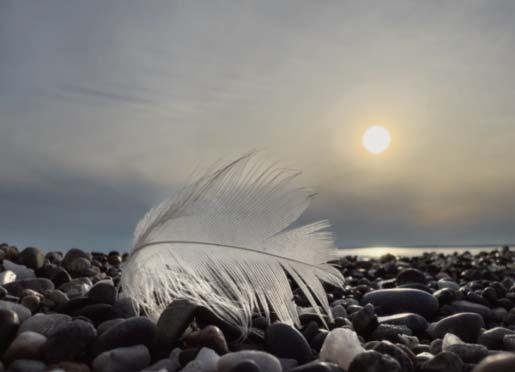
guiding viewers to see just what it was that caught my eye with nothing to distract them. With this collection of images I have been experimenting with colour grading that shifts tones to enhance mood.
Mike has spent the past 12 years teaching photography during school terms and photographing on safari during the term breaks. Online training and countless late nights of experimenting resulted in Mike developing a full complement of digital skills. After returning to Canada he was able to formalize his training and become an Adobe Certified Expert in Photoshop. Mike is a never ending learner, experimenter, explorer. His learning didn't stop with Photoshop. He naturally grew into working with Lightroom, On 1 Perfect Photo Suite, and the Nik Software collection. His advanced skills in the digital technology have allowed him to push his photographic style even further.
You can find Mike at: https://www.mikegaudaurphotography.com/ or contact him by email at, mike.gaudaur@gmail.com
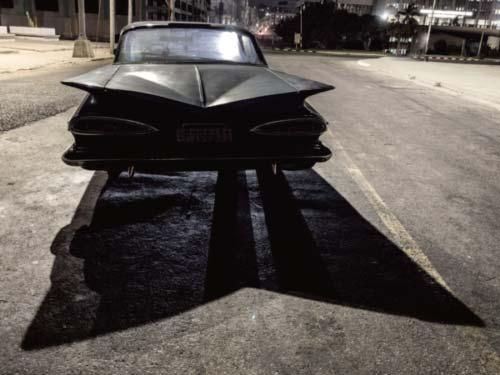
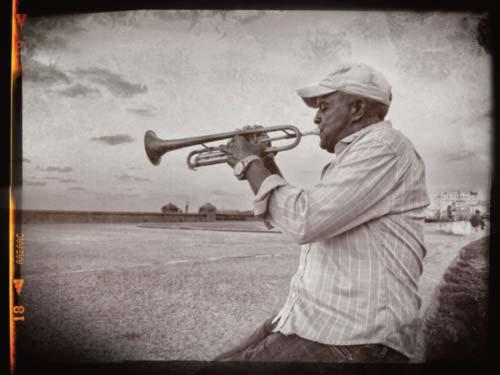
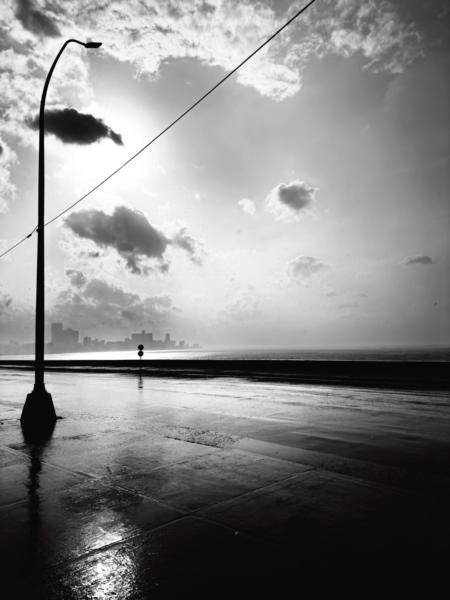



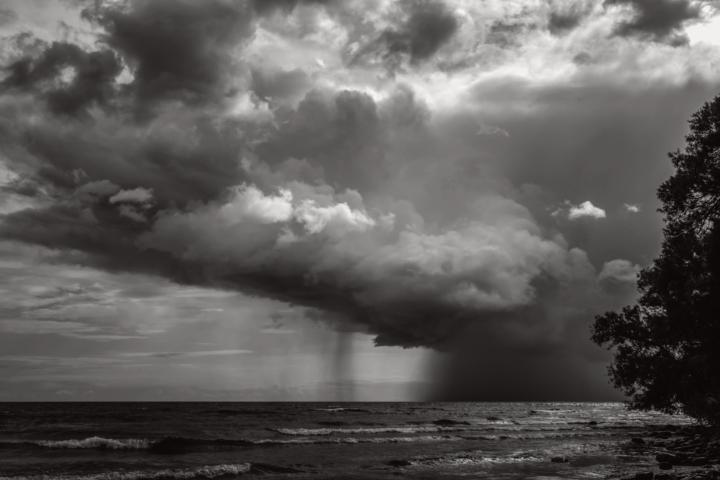
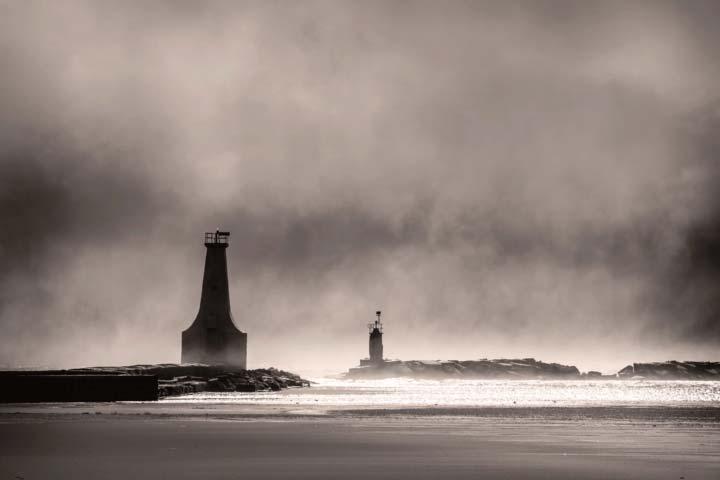
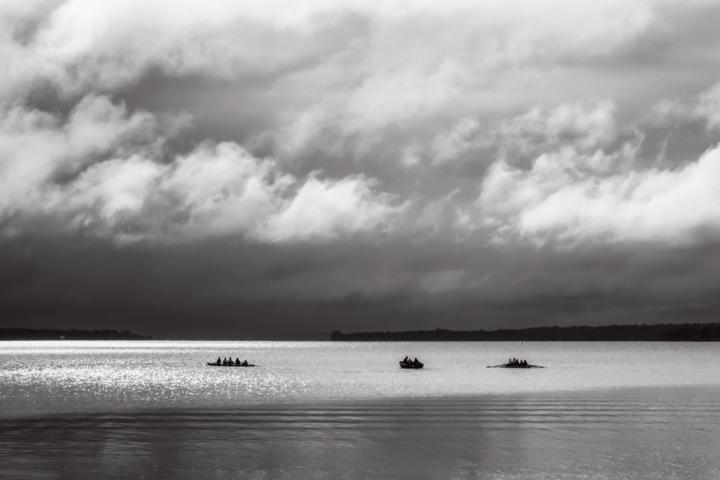
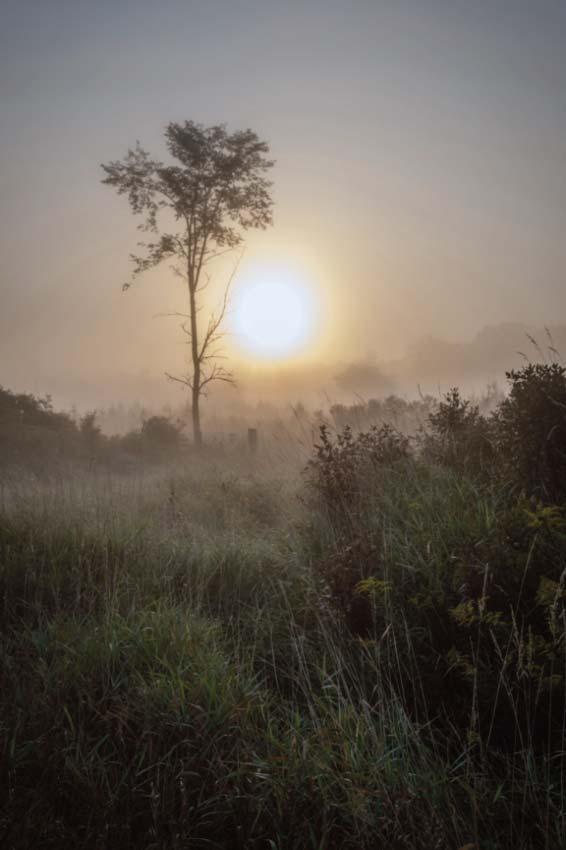
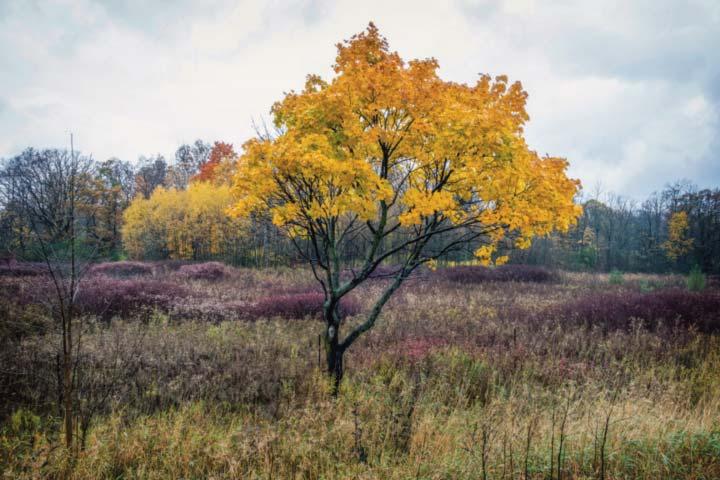
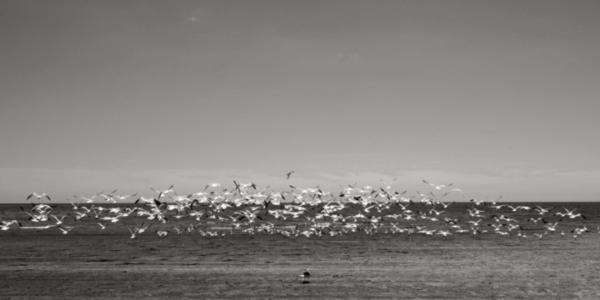
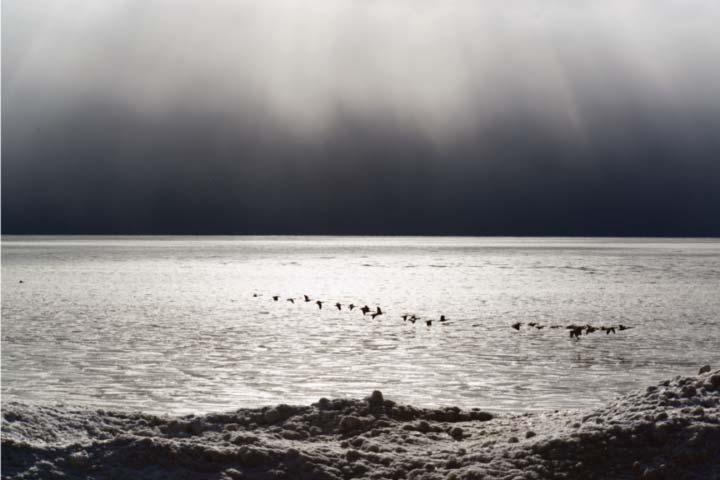
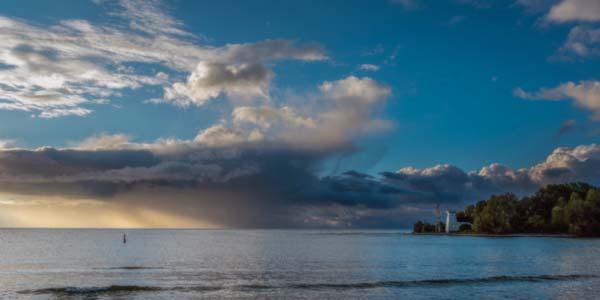
Since discovering the joys of the photographic medium in the summer of 1974, I have dedicated an enormous amount of energy to ensuring the acceptance of photography as art. As a forum for creative expression, I am constantly sharing my work through workshops, lectures, and exhibitions.
I believe that truly understanding the magnitude of the medium goes beyond simply picking up a camera and exposing film. It also involves appreciating the classic photographers who helped shape photography into what it is today. I’ve always been intrigued by both the quality of their work and the somewhat bohemian lifestyle of greats like Edward Weston, Alfred Stieglitz, and Walker Evans, to name just a few. I’ve spent a great deal of time immersed in their expressive creativity, especially during photography’s formative years.
With over 50 years of experience behind the camera, I honed my skills during the analogue era, shooting film and spending countless hours in the darkroom, before grudgingly transitioning to the digital world in 2004. I operated a commercial photo studio and gallery in downtown Belleville for 20 years.
I’ve also served as Chair of the Quinte Arts Council and sat on the Board of the Quinte Ballet School of Canada. My photographic and fine art interests are wideranging, including landscapes, dance, portraits, and fashion. I have had the privilege of exhibiting my work in numerous gallery shows at the BPL Library Galleries. I continue to enjoy talking about photography and sharing it with anyone willing to listen.
Instagram: @bobhouse49
Book Review Editor
Shane Joseph


Dear Readers:
In this edition, we feature reviews on a range of genres: novels, memoir, and poetry. The novels take us to distant lands: Morocco, Egypt, Chile, Panama and India; and from time as distant as a hundred years to two thousand five hundred years ago. The memoir and poetry ground us back home in Canada, ranging from the Prairies to the West Coast – so get ready to travel.
Shyam Selvadurai’s Mansions of the Moon covers the life of Prince Siddhartha, who went onto become the Buddha, narrated from the point of view of his abandoned wife, Yasodhara. It is a tale of women’s early emancipation struggles against a rigid patriarchy in India, rather than a how-to guide for achieving Nirvana.
In Tiaris, author D.M. Buehler takes us via a 14-year-old Canadian teenager into the mangrove swamps of Panama, and then swings us in a time loop back a hundred years to the building of the Panama Canal. The human and environmental costs of this mega project, which has propelled global maritime trade, are laid bare.
Liz Torlee returns to her favourite subject of Fate, when characters from her two previous novels, and some new ones, come full circle in A Long Walk With Fate. Her characters finally understand who they are and how they connect despite coming from different ends of the planet. Guilt and Forgiveness duel it out across Morocco, Egypt, Chile and Canada until one of those imposters wins.
In the short memoir of her father, As If Through A Window, Mia Burrus takes us into the life of a prairie rancher and her quest to discover the identity of a mystery man whom everyone knew, except her.
Rounding up the reviews is a collection of poetry, Bonememory, by Alberta poet Anna Veprinska, in which she explores topics as diverse as Ukranian Matryoshka dolls, secret Indigenous burial sites in Kamloops, and the practice of Prayer. Canada’s colonial past and Auschwitz are boldly compared and the question is asked: “How much of this country is an unmarked grave?”
We hope you enjoy these thought-provoking reads this summer!
Shane Joseph Book Reviews Editor
Author: Liz Torlée
Publisher: Blue Denim Press
ISBN: 9781998494118
Number of Pages: 250
Published Year: TBR October 2025
Reviewed by Janet Trull
Where do we come from? Where do we belong?

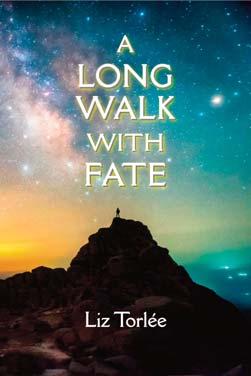
Author Liz Torlée examines the way these essential questions haunt her characters as they seek answers around the globe. A Long Walk With Fate weaves universal themes of love, forgiveness and belonging into a fast-paced narrative. Readers who have come to expect international intrigue in Torlee’s first two novels (The Way Things Fall, and In Love With The Night) will not be disappointed. Her diverse characters are fiercely loyal, emotionally fragile, and sometimes self-destructive.
Meet Aiden Quinn. Growing up in Vancouver amid the detritus and chaos of his mother Maggie’s drug addiction, he struggles to trust the adults in his world until he is adopted by his aunt, Dorothy, who raises him as her own. When Dorothy dies, Aiden starts connecting the dots of a mystery that began before he was born. Photographs and strange coincidences lead Aiden into the depths of a shadowy past. Puzzle pieces seem irretrievable until he discovers a possible connection to the identity of his father.
Is Aiden related to the famous Canadian artist, Steven Farrow? Could his own artistic talent be part of a familial heritage? The author deftly brings together a deep appreciation of visual arts and world history as Aiden is transported from Canada to attend an art festival in Morocco. In this vibrant setting, relationships meander into dark and complex alleyways. Aiden, distracted with issues of anger, abandonment and youthful folly, stumbles through a maze of confusing possibilities. Along the way he must reconsider the motives of both allies and adversaries, confront his ghosts, and learn to trust in fate.
“The lives of the people they had loved in the past and would love in the future — all were meant to intersect, fuse inextricably together,” Torlée writes. Her characters become endearing as their struggles and demons are revealed, confronted and resolved. Like a river, the theme of belonging carries them along on a turbulent current of self-discovery. “Guilt is the heaviest of burdens,” writes Torlée, “but the inability to forgive is heavier still.”
A Long Walk With Fate reminds the reader how much lighter life’s journey is when we release our burdens. Lukas, a character with the wisdom of a much older person, completes the metaphor of a jigsaw puzzle when he says, “You think one piece goes in an empty place. It’s got the right colours, so you try to make it fit, but it won’t go in. It belongs somewhere else.” The world seems vast and lonely when you are seeking a place to belong, but home is never farther away than your very own heart.


Liz Torlée lived in England and Germany before emigrating to Canada. Much of her writing is rooted in the idea of fate and the mythology of the night sky — fascinations since she was a child. Her love of the mystical beauty of desert landscapes has inspired many of the settings in her novels. Liz and her husband live in mid-town Toronto. Her previous novels on the exploration of the theme of Fate are The Way Things Fall (2020) and In Love With The Night (2022).
Janet Trull is the author of two critically acclaimed collections of short fiction, Hot Town and Something’s Burning, published by At Bay Press. Her essays and awardwinning stories have appeared in the Globe and Mail, and Toronto Star, among others. Her latest novel, End of the Line (Blue Denim Press), was released in 2023.
Author: Mia Burrus
Publisher: AoS Publishing
ISBN: 9781998662463
Number of Pages: 73
Published Year: 2025
Reviewed by Felicity Sidnell-Reid
Review
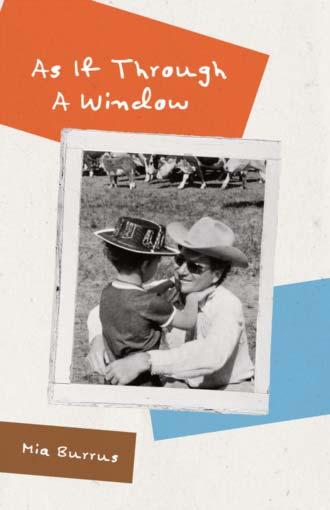
“The singular act of the weekend was tossing your ashes in the summer breeze. They fell into the startlingly green grass. I see you still when I see the prairie—all horizon. Though you, too, are gone the way of the bison, you are there in the grass, you are the grass, the prairie, the past.”

“This little book” is how Mia Burrus, poet and multimedia artist, describes her memoir of her father Étienne Burrus, his life and passions. It may be little, but it is extraordinarily rich in its mixture of forms; poetry, pictures, photographs, letters, documents and recollections from a variety of voices including the author’s. These fascinating vignettes take the reader on a “voyage of discovery” that draws a picture of Étienne and the ranch in the semi-arid Palliser triangle that absorbed his energies for half his life. It also follows his daughter’s search for the man behind “Mr. B”, a character “well-known to others but a mystery” to her.
The book is available for pre-order at: https://www.aospublishing.com/mia-burrus


Mia Burrus lives in the country north of Cobourg in a restored one-room schoolhouse, where she writes and creates collage/bricolage. She has published a poetry chapbook, What I Don’t Know, and several of her artworks were chosen for recent juried shows at local galleries. Visit her own gallery, www.miaburrus.com.
Felicity Sidnell-Reid is the co-host/producer of the radio series, Word on the Hills, on 89.7 FM. Alone: A Winter in the Woods was released by HBP in 2015. The Yellow Magnolia in 2021, followed by The Many Faces, Aeolus House, in 2022. Her short fiction and poems have been published in both print and online journals, and in anthologies.
Author: Anna Veprinska
Publisher: University of Calgary Press
ISBN 9781773856100 (hardcover)
ISBN 9781773856117 (softcover)
Number of pages: 99
Published Year: 2025
Reviewed by: Patrick Connors
You may have seen a wooden Matryoshka doll. It is actually a set, gradually decreasing in size, stacked inside each other.
In the poem “Matryoshka”, Veprinska depicts such a doll from her native Ukraine displayed in glass in a sitting room. She uses it as a metaphor to show that the narrator’s mother wants to become a grandmother.
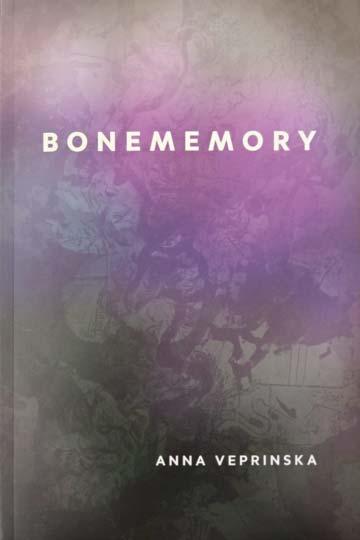

The doll is also shown to be a figure of protection, of sharing the weight of life. We sense the strength of women, and know this is a theme of civilization. It is as simple as an artefact in a living room and as complex as a beautifully crafted poem.
Inherent to this nurturing strength is an underlying fierceness. “Each matryoshka grips/both broom and spear.//Each (fertile or not) is sliced with glory, with howl.”
Here Veprinska made a literary allusion to the great poem “The End and the Beginning” by Wislawa Szymborska. She has successfully adapted it to the current era.
Rather than let us believe our nation is exempt from terrible history, the author ends the first section of the book with “Shoes”.
This describes the discovery of the remains of 215 Indigenous people found at a former residential school in Kamloops, British Columbia. The reader should recall how this inspired memorials across the country featuring the shoes of children.
The narrator compares this to piles of shoes viewable at the Auschwitz Museum. There is no pretty way to write about genocide.
Three times in the poem, including the final line, Veprinska repeats the same uncomfortable question about Canada: “How much of this country is an unmarked grave?”
In “Vowels for God –”, the reader will notice the end stop after the title. This foreshadows a number of Em dashes, and one more end stop, amongst the text. Most of the poems in Bonememory have very standard, even minimal punctuation, or else very experimental line forms. It is clear this piece is unique.
This poem is about prayer, the practice of asking for something and waiting for the desired outcome. It is communication with God while being present in the world and all that it contains.
Veprinska came up with this captivating personification of barriers to prayer and battles of spiritual warfare:
“...I became convinced an imperceptible bird (maybe a hawk?) had theived the night words from my mouth, tucked them into its plumage –a pickpocketing plea vessel – and winged away.”
The final stanza begins with the format change of prayers to handwritten notes, since birds cannot read. I consider my own early, often handwritten, drafts to be a plea to God, a confession of my lack of clarity, my prayer to be given the perfect words.
The poem ends with the ordering of vowels: “o, a, e, u, i, y.” Perhaps, like the birds, I am not meant to understand. But I am compelled to wonder, and I surrender to the mystery.
Anna Veprinska is the author of Empathy in Contemporary Poetry after Crisis. She was a finalist in the Ralph Gustafson Poetry Contest, has been shortlisted for the Austin Clarke Prize in Literary Excellence, and received an Honourable Mention from the Memory Studies Association First Book Award.


Patrick Connors is the author of The Other Life and The Long Defeat, both published by Mosaic Press. He was one of four poets featured in Bottom of the Wine Jar, published by SandCrab Books in 2017, and launched in the beautiful pearl of Gibara, Holguin Province, Cuba.
Author: Shyam Selvadurai
Publisher: Penguin
ISBN: 9780143462354
Number of Pages: 402
Published Year: 2023 (originally published in 2022)
Reviewed by: Shane Joseph The Review
The life of the Buddha, told mainly from the point of view of his wife Yasodhara, reveals him as human, fallible, and not such a nice guy.

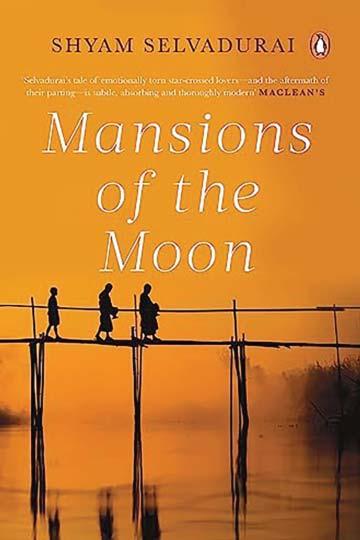
Siddhartha is an unhappy royal (Prince Harry comes to mind), son of the rajah Suddhodana of Kapilavastu, constantly pondering the secrets of the human soul and disinterested in the trappings of royalty. He drifts from following the suicidal precepts of the Nigantha ascetics (fast until you die) to the Maharajah-turned-ascetic Maha Kosala’s Truth of Truths philosophy of moving from Atman (soul) to Brahman (God) via intermediate stops at the Mansions of the Moon (Limbo) and Land of the Father (Heaven). He finally lands on the concept of the Middle Way where nothing is permanent and everything is changing.
He marries his cousin, Yasodhara, falls out of favour with his father, and is posted on hardship assignments to remote corners of the republic, but always delivers stellar results, despite his boredom. They are childless for the first ten years of their marriage before a son, Rahula, is born. Grandpa Suddhodana is overjoyed because his nephew Mahanama is set to inherit the kingdom as Siddhartha is considered weak and interested in loftier ideals than meting out punishments to maintain rule by fear. Sidhartha, as the legends corroborate, finally escapes Kapilavastu to take up the life of a wandering samana (ascetic) and earns Yasodhara’s enduring disappointment for being betrayed.
The novel begins ten years later, when Yasodhara learns that Siddhartha, now a renowned holy man in the land and to whom many miracles have been attributed, will
be passing by Kapilavastu. It is at a time when Suddhodana is close to death, and his household of women, per the custom, will be turned out of the palace to return to their ancestral lands. The book constantly returns to the plight of women and their subjugation to men. Widowed or single women have only two options: become courtesans or bonded slaves.
Yasodhara and her mother-in-law strike out for a third option: become samanis (female ascetics) and join Siddhartha’s band of samanas, many of whom are the husbands or sons of the abandoned women. But herein lies the kicker: Siddhartha does not want them. His verdict is that “a samana path that includes women will soon wither and die.” He fears that the detached love the samanas practice will soon deteriorate into a possessive love if women re-enter their lives.
Despite many battles and palace intrigues that dot the story, the central conflict is how Yasodhara carves out a role for women to play in the ascetic life that dominates society in the republics of the Middle Country, now known as India. But it is a pyrrhic victory, for what they achieve is another lopsided role, with more rules for the women than for the men. You could say the women arrive at the Mansions of the Moon but need to work harder to reach Brahman.
Selvadurai has used extensive research and inserted Pali words (there is a glossary at the back) to paint a vivid picture of life in the times of the Buddha. This reconstruction of life, laws, customs, values, beliefs, and the evolving philosophy of Siddhartha are the most endearing features of the novel.
Shyam Selvadurai is a Sri Lankan-Canadian novelist who wrote Funny Boy (1994), which won the Books in Canada First Novel Award, and Cinnamon Gardens (1998). His YA novel, Swimming in the Monsoon Sea won the Lambda Literary Award in the Children’s and Youth Literature category in 2006. He lives in Toronto.


Shane Joseph is a Sri Lankan-born, Canadian novelist, blogger, reviewer, short story writer and publisher. He is the author of eight novels and three collections of short stories. His latest novel, Victoria Unveiled – in Search of Sentience, was released in September 2024. For details, visit his website at www.shanejoseph.com.
Author: Deborah M. Buehler
Publisher: Ridgecrest Books
ISBN: 978-1069129918
Number of Pages: 308
Published Year: 2025
Reviewed by Josée
Sigouin
The Review

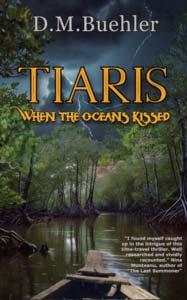
In Tiaris, When the Oceans Kissed, Deborah M. Buehler deftly weaves historical fiction with a coming-ofage story, along with threads of fantasy in the form of time travel. Fourteen-year-old Tiaris has just started to fit in at school in Canada when her mother, a biology professor, receives funding to spend her research year in Panama. Despite Tiaris’s initial reluctance to follow her parents, she is granted greater freedom than at home and begins to enjoy her new environment.
A dug-out canoe excursion through a mangrove forest turns topsy-turvy. Tiaris finds herself flung a hundred years into the past. A seer in Panama City had previously warned her to stay away from the mangroves, prophesying that she would not be able to find her way home. Tiaris must now adapt to radically different circumstances. She not only witnesses history in the making— building the Panama Canal—but also lives through the political, sociological, and ecological upheaval caused by the mega-project. The ruling class treats manual workers like expendable labour, barely human. They foster a divideand-conquer atmosphere between groups of migrant labourers lest they unite to demand safer and more equitable working conditions. The commercial expediency of shipping faster across continents gobbles up large swaths of fragile ecosystems, concomitantly silencing the oral traditions passed across generations by the rainforest’s human stewards.
Tiaris is named after a small Central American bird, commonly known as the Yellow-faced Grassquit. Like her sociable namesake, she quickly makes friends with Gianni, a teen lured from Barbados by the prospect of paid work, and Carmen, a talented, young herbalist. Tiaris learns to clean, cook, care for a child, and “manage up” her demanding boss to earn a living until she can fulfill the requirements of a legend that promises to return her to her time. Tension ratchets up as an embittered foreman thwarts her plans at every turn.
The Isthmus of Panama has held geopolitical importance for as long as humans have inhabited the Americas. Building the Panama Canal, originally a French endeavour, led to the USA-assisted liberation of Panama from Colombian rule. The canal’s successful completion by the USA in 1914 yielded substantial savings in moving commercial and military vessels between the powerful nation’s coasts. A 1977 treaty ceded control of the Panama Canal Zone to the Panamanian government, becoming fully effective at the end of 1999. Twenty-five years later, more geopolitical tensions erupt when US President Donald Trump alleges that China holds too much power over the canal and threatens to regain control.
Buehler's luminous prose conveys Tiaris’s astonishment at discovering pristine Panamanian forest destroyed in building the canal. The story’s pace is propulsive. Will Tiaris find her way back, or will she remain forever trapped in another time and place?
Author bio
D. M. Buehler is an author, ecologist (Ph.D.), research analyst and teacher (B.Ed.). She weaves together extensive knowledge of biology and birds, careful research on the history of the Panama Canal, and a touch of fantasy to create a captivating story in her debut novel Tiaris: When the Oceans Kissed
Reviewer bio


Josée Sigouin is French Canadian and lives in Toronto/Tkaronto with her Chinese Canadian husband and two sons. Her debut novel, Our Fifth Season, where murder derails love, will be published by Blue Denim Press in October 2025. Josée also enjoys cycling, gardening, and welcoming birds to her tiny garden.
Poetry Editor: Bruce Kauffman
Photo Editor: Richard M. Grove


Bruce Kauffman lives in Kingston and is a poet and editor. His latest collection of poetry, an evening’s absence still waiting for moon, was published in 2019. He facilitates intuitive writing workshops, and hosts the monthly and the journey continues open mic reading series begun in 2009, and also produces & hosts the weekly spoken word radio show, finding a voice, on CFRC 101.9fm he began in 2010.
becoming as a day leaves it becomes neither shadow nor invisible but paints itself instead as the hue of every colour in a next coming day
centre in its very centre – at its heart but still emanating through is any particular thing’s essence each thing ever changing but original essence remains untouched and no different the acorn the oak
blue after Julia McCarthy’s “All the Names Between” blue comes to us to remind when another colour leaves or when we are looking away or when we believe we don’t dream in colour or in a ravaging world or day when all other colours are too much or not enough
Ana Johnson apj.ajohnson@gmail.com
Kingston, ON
Launching from the Kingston Yacht Club
Kayaking along Lake Ontario
Into the throat of the Cataraqui River
Among the elements
One paddle splash after another
Bass breath shimmering
On my torso twisting
Muscle spasms
One more, then another
Right, left, right
Some days at the wind’s wrists
Surfing the waves
Other days, flat
Flickering on quiet lucid
Emerald and blue
Diamond speckles
Mirrored clouds
And under the verdant Bascule Bridge
Hums and sways of shadowy vehicles
Echoing on the naked water
A far away splash moves in my ear
And I’m swallowed into a drafting call into the void Into the beginning And the end of time.
Alanna Veitch alanna.veitch.av@gmail.com
Kingston, Ontario
I’m told that I’m quiet, but inside my mind my voice echoes across chambers not yet, perhaps never, audible.
It’s as if I am yelling –across tables and spaces I thought were vacant enough to house my words.
So, what is it to be quiet? What is it to be loud? What is it to be these convictions bound by what our voices allow and what our bodies permit us to experience and escape?
And escape we surely have! Competing for airspace while I continuously fall towards near silence.
I’ve always lived within this category: quiet and stuck reaching, but not quite landing.
Sometimes, I have a promising beginning but any sound I produce soon trails as if I must be departing somewhere.
And I’m not terribly fond of leaving or of competing –of trying to snag a spot in the space above and between us, so
I’ve become terribly curious about what happens to the utterances that have left my body but stayed nestled close beside and quiet.
This is it to be bound by what my voice allows and what my body permits me to experience and escape.
Anna Panunto antod@sympatico.ca
Montreal, Quebec
Sugar maple, Black maple Red maple trees. Ah, the syrup of education! How tasty it was!
Let me concoct my own breakfast of knowledge with forgotten fruits and yellow birch.
The Madmen in suits re-inventing the supposed wheel. Perhaps, it stopped turning long ago.
The falsely learned…. by Master teachers of modern times. Haunted ghosts.
Leave them in the cemetery, they say!
Iron masks ripped apart Injustice, changing the needle of time.
Hold on to your weapons- boiled sap!
And know when to throw the buckets
For the long-horned beetle has already made its way…. Oh, those poor maple trees of yesterday!
Brian T. W. Way btwway@gmail.com
Rednersville, ON
sunny ways my friends sunny ways… have faith in your fellow citizens my friends they are kind and generous open-minded and optimistic and they know in their heart of hearts that a canadian is a canadian is a canadian —justin trudeau victory speech 2015
our sunny prince of shadows cast ever in the flair of that pater-star and yet first-past-the-post & gender woke legalized both dying and wacky smoke a senate by merit instead of cloak and child poverty diminished indigenous drums let sound climate and carbon arrested as that wuhan bug crept round but canceled by crystal blight toxic rumour and trumpet of doom as canadian and canadian and canadian marked down their gritty choice shadow hushed in the heart of noon
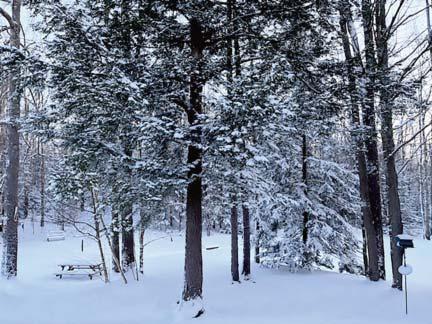

di Nardo Sutton, Quebec 01


Quebec 02
Bruce Cudmore cudmorebk@gmail.com
Rockport, ON
My Gardener
It starts with a dream of rows in thawed earth
loosened by tines, enriched and mixed in chanted prayers;
seeds counted and nestled into warm welcoming furrows and scrapes of dirt and gentle pats and trickled water and treasure sought;
provisions I can already taste, and I can feel your careful hands
working. All things tenderly imagined will come alive when they’re ready, and they’re never ready without you.
Christopher Black
January 16, 1950 - June 05, 2025
Campbellford. Ontario
Where is the grave of War, my friend? Does it lie upon a mountain high, or in a desert vast, Or down below a troubled sea, seething with the past, Oh, can you tell me, quickly, and there me quickly send, For then I’ll know it’s over now and Peace again descend.
They say it is a monster, a nightmare roused awake, Ready deep within us, ugly, deadly, dark, To spread chaos universal and snuff life’s feeble spark, That feeds on sorrow, hatred, heartache, And drinks deep to quell its hunger from a blood-filled lake.
And if no grave exists where rots its stinking head, Then surely we must slay it, rid the world of pain and death, But what’s been done to do it, or do I waste my breath, On a quest that’s more than urgent, one I cannot shed, But nor you nor they me answer, just weep for all dead.
Editor’s Note: I was in the communication process with Chris after accepting his poem in mid-June. In mid-July, his life companion, Gail, discovered the thread of emails and contacted me with the news that he had passed. Again, here, my condolences to her, his family, and friends.
I did ask if she would think it was appropriate to still publish the poem I’d already accepted from him. She said, ‘Yes’.
I also asked if I could include the link to the very touching funeral notice that described him & his life for anyone interested. And Gail agreed. Here it is: https://www.cardinalfuneralhomes.com/obituaries/mr-christopher-charles-black/ Bruce
David Malone maldc4@hotmail.com
Kingston, Ontario
The Cormorant
Black as a crow, you often hear, or a raven, but the sleeker cormorant is also black.
Low over the unusually still surface of the water he came, and I on my back just as still on it.
So still you could hear it embrace the first heat of the sun, toward which he flew.
I was thinking of being older – sixty now –and of how I’d known, really known, so few people in life.
(When my brother turned sixty at least that many attended the gathering.)
He mustn’t have seen me till he was right upon me, a slight turning as I turned my head.
Just the tip of a wing, that’s all (a slight mark on my brow, that’s all); though startled, he kept on towards the sun.
Awkward fliers, I’ve always thought, but superb divers (as water birds rather made for that);
and the distance, searching and searching –as I have searched and searched –they can swim beneath!
Still and black as sun-splashed glass, whereas the day before when I’d swum, with the winds hard from the south, swells of six feet tipped white.
So what had scored me the day before were like the roarings, it felt, of the primordial deep.
For all that, still the touch of the bird’s wing was the more hurtful thing.



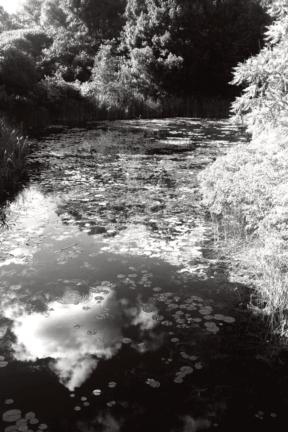
Codrina Ibanescu
codrina.ibanescu@gmail.com
Etobicoke, Ontario
Leave your regrets For the grave
For tomorrow rays burn
As brightly as your Hearts desire And fortune favours the brave
Do not wallow in malaise
Put each foot in front of the other
And mark your path with grace For tomorrow doesn’t bother itself
With thoughts of yesterdays
One blink of an eye And yesterday is gone
Leaving no room for sorrow
No stones left unturned
Can be turned again, tomorrow
Breathe and learn to follow
The carvings left behind
Ease your heart and soul –For today is the horizon
Of a new state of mind
Dinh Le Doan dledoan67@gmail.com
Beaconsfield, Québec
From their lofty heights, the stars have been gazing down at us for hundreds of thousands of years. And they do not stop gazing, for they’re still amazed by what they find, at what we become: Our star-like brilliance that animates as it shines. Perhaps our vast distances to the stars are only short arm lengths
on their scales. And our immense millennium is less than a blink
of their eyes. We are thus in the stars’ laps or cuddling gazes still. And yet we have begun
to cry out questions on our origin. Where did we come from? How did we get here?
To the furthest stars and beyond them we have been gazing back, hungry for answers.
DVE McBride
dayle.mcbride@sympatico.ca
Amherstview, Ontario
Privation
Overhead contentious winds guide spirit and cloud Words rustle between the trees
They know this story too well Across the road survey stakes pierce tender soil
Hectares sectioned off to be land –reinvented Yet another subdivision with chain-link fences in every shade of metal; vegetation removed to make room for newer vegetation Easier if we pretend the stand of pines was never there
Elizabeth Hill elizzhill@gmail.com
Toronto,
Ontario
I sweep your hairs from the stairs, and pick them from my tea, but your hairs in my heart will always be with me.
Eva Kolacz
eva.kolacz@gmail.com
Victoria, BC
Stepping into the Immortal Forest for my mother
I’m still in possession of the room you lived in.
On the table stands the jar with forget-me-not flowers, in the corner easel with your unfinished painting, the brushes and paints suddenly abandoned, still there.
Recently
I stretched the walls of the room, you know how they shrink over time, first losing colours, then, all the juices keeping them alive.
And I stripped the skin of the walls from shadows which easily can turn into black holes fit so well for backstage dramas.
That day of early autumn was not different from other days of early autumn except for the maple tree shading leaves on the sidewalk.
And for a moment I existed in a spinning carousel of golden smoke and mist.
I picked up one leaf and placed it in your hand when you were just about to step into the immortal forest of silence.

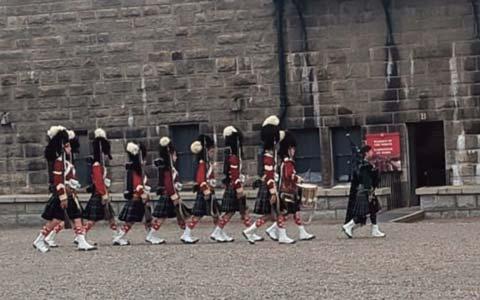

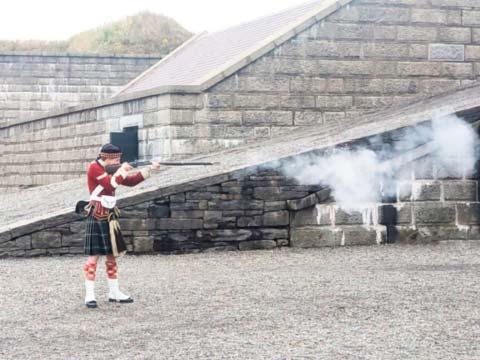
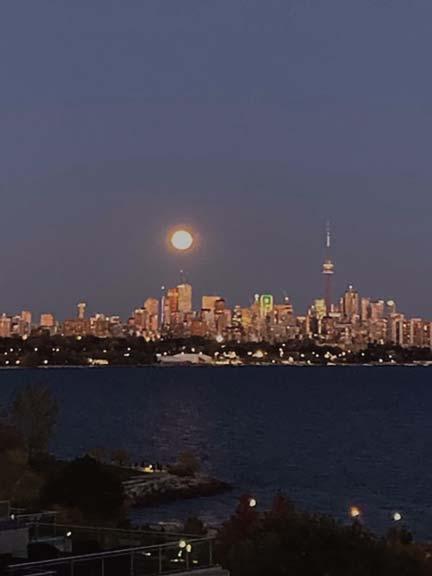

Toronto, Ontario
Gordon Gilhuly ggilhuly@rogers.com
Woodstock, New Brunswick
last touch
this last touch of winter, like a travelling salesman, unpacking all its laces and white cloths, spreading them everywhere, giving the maidenly trees long gowns of trailing white:
a sudden slant of yellow, early spring wildflowers, flung across the thwarted winding sheets of snow
whispered gossip of a little stream the sky ripped open by scars of blue across the tract of clouds
Keith Inman inman@vaxxine.com
Thorold, Ontario
the sun stretches across clay tiles
to wake the yellow wall like a burst of pollen
above the glass table with its page-marked book
and half-filled cup of coffee gone cold
while the jade in the corner bides time
Katerina Vaughan Fretwell
kfretwell@cogeco.ca
St.
Catharines, Ontario
In grade 11’s Yeats and Eliot feast, I raged, “It’s all about death and war!” The teacher kicked me out for that class.
In the hall, The Second Coming –gaze blank and pitiless as the sun and The Hollow Men –This is the way the world ends Not with a bang but a whimper –
Caught in a maelstrom at those words, I was already mourning my family fatally swamped by booze and smokes. The lines gripped me like the choke-hold swimmer’s carry.
Only the feisty lifeline from Dylan Thomas tossed me a fight: Do not go gentle into that good night. Rage, rage against the dying of the light.
English class soon over, the preppies sauntered out, followed by prim Miss Luchterhand.
Unaware how heart-chosen words capsized me, they could not fathom that my truculent protest
proved that poems whirled inside me –decidedly not “Ho-hum, shall I wear paisley or silk shantung for Saturday’s date?”
“The Waste Land” echoed the preppies: What shall I do now? What shall I do?...
Pressing lidless eyes and waiting ...
Kathy Robertson kathyrobertson0234@gmail.com
Kitchener, Ontario
It’s been a year since you soared above a starry night into the arms of the universe;
since we made love like it was your last day on earth because it was;
since attendants carried you from our home on a quilt-cradled stretcher to an awaiting hearse;
since I went to bed alone wrapped in your pajamas;
since you promised to return as a cardinal and, oh, you did! You did!
Now it’s Spring your irises emerge through the awakening earth like butterflies shedding their shells because it’s been a year.
K.V. Skene kv.skene@gmail.com
Toronto ON
From the far edges of the galaxy’s curve
we cup eternity travel from the beginning of time to the end of everything we love circle the world’s edges claim them for ourselves like a god plays with gravity stretching the infinitesimal to the universal and still be still believe if only for a nanosecond in every wild and wordless thing that ever was and is and breathed in the chaos still determined to dig deeper and deeper
build higher and higher locate the genesis of our accelerating dismay and follow its snarled strands back from their knotted beginnings to their fraying ends
high overhead and still tethered to our mothership what we think we dread is not will never be some rough beast with a terrible hunger but our slouching selves still sound asleep beneath a strawberry moon




Honey Novick
creativevocalizationstudio@hotmail.com
Toronto, Ontario
Chloe Cooley is her name
Chloe Cooley’s significance unnoticed by fame
But
Chloe Cooley made history, her story
Her story changed the laws of Canadian slavery
Because of Chloe Cooley, Canadian slavery came to an end
Her story was something no one could portend
Sold like chattel and property without a quiver
She was sold across the Niagara River
Fortunately witnessed and then reported
By Peter Martin, a Black Loyalist
This was a story he couldn’t resist, told
To Lt. Gov. John Graves Simcoe
Of the sale of this human cargo
So…
To pass the Act
No turning back
Time to pass the “Act to Limit Slavery”
Upper Canada, in 1793
The act was passed within a year
Stoking the flames of some people’s fear
Setting up legislature on this land
The first and ONLY act the British Colonies had at hand
This limited slavery
Done with patience, fortitude and a lot of bravery
Until full abolition was passed in 1834
Truly a human condition that only some people abhor
Yet, this was a victory galore
Back to Chloe Cooley….fearless, peerless, It’s time to honor her with gratitude and fame
We’ve learned a little of what encompasses this name
Chloe Cooley
It is our duty to say her name…….
John B. Lee johnb.leejbl@gmail.com
Port Dover, Ontario
a little plaster bust of Goethe occupies a place of honour on my desk though with every movement of my writing hand with every shiver of my arm he topples like a dreidel slowing to a stop he tumbles into one of Dante and they tremble as they fall like kings surrendered in a game of chess, to me each clack resounding it seems as though I were a vandal tipping tombstones in a yard of graves where poets lie in grassy silence made from a model of the world of words a miniature where every sentient breath is pushing smoke
I purchased the one in a tourist shop in Florence the other at a museum in a house in Munich where Goethe lived and they seem to watch me while I write though they are both of them blinded by time like memories that are mine alone or dreams I’ve dreamed without recall
I have their books closed up upon a shelf like rooms in darkness, occupied I hear a door ajar a silent footfall on a vacant floor an empty rumour of the presence of a quiet voice where Virgil’s hand is reaching through the empty air like candle snuff a withering and redolent inquiring of light no longer there
Mia Burrus miaburrus@gmail.com
Baltimore, Ontario
By the time the Canadian Pacific Railroad was completed in 1885, only 23 homesteads had been claimed along the 400 miles from Moose Jaw, Saskatchewan to Calgary, Alberta. Captain John Palliser, a British government surveyor, had surveyed the area in 1859 and deemed much of the area a semi-desert, unfit for agriculture.
But at the turn of the century, it flashed its green riches for a few wet years, blinding all who saw it to its true nature, and the prairie filled with new immigrants. Then it dwindled back to its usual dry dullness. By the 1930s many homesteaders had walked away their farms.
excerpt from As If Through a Window, AoS Publishing, 2025
sovereignty was our made-up tale hammered bronzed burnished over a few short centuries hardened into coin du realm hollow at its core
freedom was the emptied plain the unbroken wind-whispering sea of grass (Palliser’s Triangle – the palest yellow on the map) soon enough railroaded and fenced soon enough fetters and false hope
Rebecca Clifford becca.clifford@gmail.com
Caledonia, Ontario
Dry summers of unrelenting sunshine, the permanent press of a clean blue sky,
a late luncheon of ripe cheese, fresh loaves, crusty from the oven, olives brined or not. And wine, wine about 3 weeks borne, in any old bottle Marcello could lay
his hands on. Wine with no personal pedigree, more a sassy grape juice with attitude that knew someone important or had a rich uncle in local government or at the butcher shop.
Then, that sweet accordion playing nothing in particular, lolling through the evening’s
cool of the cafés, spilling onto the blue cobblestones. The wine always takes me
to the evening respite but I’m pulled there only after the red poppies, nodding in the oil and linseed breeze, and the round gloss of sonic-scented yellow lemons first catch
my attention.
In response to William Blair Bruce’s Landscape with Poppies, 1887 oil on canvas, Art Gallery of Ontario.
Robert Currie currie.robertdm@gmail.com
Moose Jaw, Saskatchewan
Too tired to read any longer, I watch the dragonfly circle, hover, and land on my thumb, its wings shining like coins fresh from the mint. A narrow, purple cord with eyes, it remains there while I slowly drop my hand to rest on my knee, the dragonfly as still as the stone that gleams at the water’s edge.
Here on the shore of the lake we reside—the dragonfly and I— at ease in the kingdom of August, hours sliding to dusk, days growing shorter, summer falling away, both of us content to remain a while in sunlight and shadow as clouds drift by. I feel now that I know what it means to be touched by the hand of God.
Teresa Hall thallartist@gmail.com
Scarborough, Ontario
Along the dry riverbed they trotted with their heads held down, dust swirling in their hoofprints upon hot cracked ground. Their manes caked with dirt and lifeless, strength nearly gone yet still they came across the plain steadfastly moving on; as generations had gone before, now nearly the last of a dying breed, almost a part of folklore. Ingrained in the land and the land in them. Could they make it to the end? The stallion called softly then led them to the fell; their destination reached, drank deeply from the well.
Steve Noyes snoyes@vanisle.net
Victoria, British Columbia
He had been gone for years when I entered the log cabin with a peaked roof, at the edge of his widow’s property. No power inside, so I had to creak the double doors open. With an inhibition akin to breaching an Egyptian tomb, I braced for chaos. My eyes adjusted. Syrupy firewood smell. At the roofline, among infiltrating blackberry vines, a snaking phone-line which he cut in one of his foul furies because he no longer wanted to be reached, or because he was absolutely convinced that the same guy who prowled inside his computer was inside the phone.
He would lose track of time, fiddling and fixing trimming and shimming, and she’d call down saying Supper’s on. Perhaps. I wouldn’t want to make things up. There’s a leaning heap of long-handled tools, hoes, shovels, rusted secateurs now only good as a kind of tongs, and blunt axes, their blades jammed onto too-narrow hafts —a bloody wonder he didn’t kill someone. He sharpened them with an antique rasp. Five skill-saws. Most folks just have one. A grease-gun, a word I’d only seen in print before, now reified. Innumerable paint-cans whose contents had solidified.
I hefted his limp slingshot, and with a grim smile thought of the aging, addled boy who sighted the power-pole and let fly, trying to take the hydro-workers down. All projects stopped, he came to the cabin to be alone, to sit on the grubby Styrofoam cooler, watch the sun shoot rays through the roof-chinks and make bright patches on the cement floor. I thought I might find him here, but I got lost in this inventory. Time to sort out all this machinery and these tools into lots, bang the dust off, display them on tarpaulins on the lawn before the early bargain-hunters come.

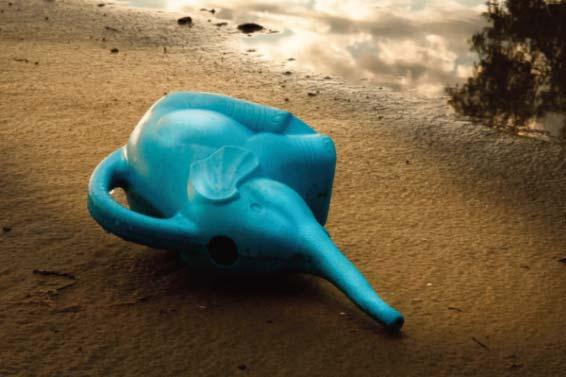

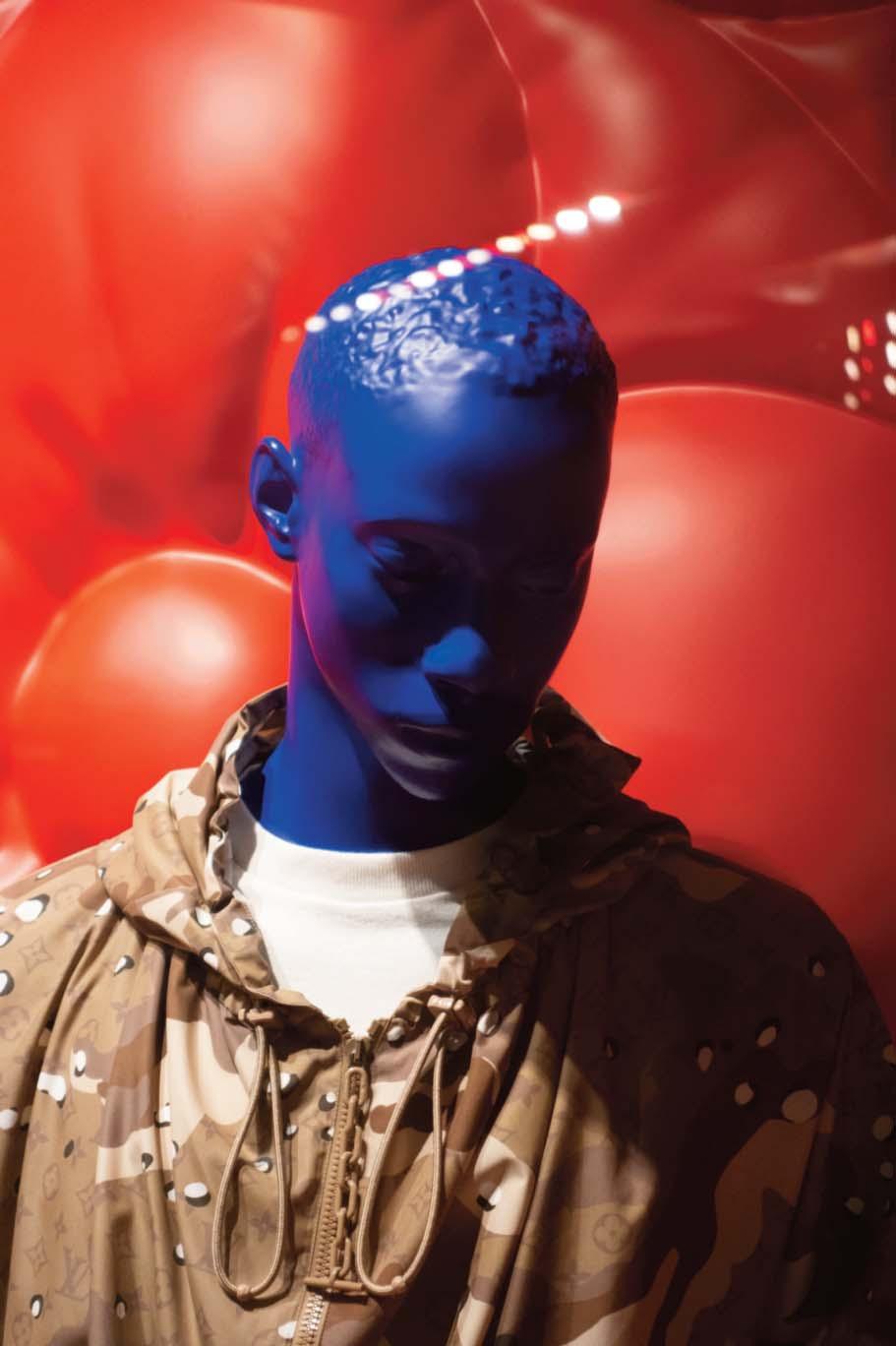
Susan Smith essaysmith69@gmail.com
St. Catharines, Ontario
The storm is still roaring. Waves three times my height beat the beach, churning the colour of sour cocoa.
Another three hours to go to high tide so I don’t dare predict — could be bluster or could scrape the whole building to the sea, tottering, bobbing, dropping chunks of itself all the way to Mexico.
I am making bread while I wait.
I’ve never known what the world needs of me but hunger is a rare gift of certainty —
as is knowing I could spend the whole day with neighbours picking rocks and rotted coconuts from the parking lots — what the old ones do when a baffling tantrum has passed.
When we’ve collected the rocks together we will lay one on another, new beachside limit of our hopeless fiefdom.
We will bring out of sanctuary beach chairs hidden in stairwells.
We will set wind and water our enduring challenge: Swipe away our concrete slabs our salt-pocked windows, ruined gardens.
Pitch us in the bin of what’s forgotten.
We pick rocks. We break bread.
Richard M. Grove
RichardGroveTai@gmail.com
Brighton Ontario
August 7th – Presqu’ile
The weatherman calls for 32°C today, there’s no rain in sight.
I’m walking a familiar path through the woods, it feels like the forest is holding its breath, less like the middle of summer, the beginning of an ending. The air is heavy.
Except for the deep rooted trees everything droops with fatigue. Brown tipped leaves charter along the path, grasses, wildflowers, and ferns bow low, gasping, pilgrims nearing the end of a long journey. No birds sing in this dry heat.
No squirrels scamper.
A passing dog pants heavily, seeking shade from a sun that offers no respite.
Yanlan Yu elaine.yu@lifetech.com
Toronto, Ontario
The Tulip blades like fresh jade, breaking through the rock.
Soon they’ll wear gold, violet, pearl-white so ancient, and serene.
I love them as much as Rilke’s roses so deep, and luminous.
Yet you’ll never know how they think of you in verses layer upon layer.
“A leaf is in the puddle over there…”
They murmur sometimes, in self-surround cosmos exhaling fleeting sorrow from a dream a sigh of fragrance.








Anna Di Nardo




Artist / Musician / Songwriter

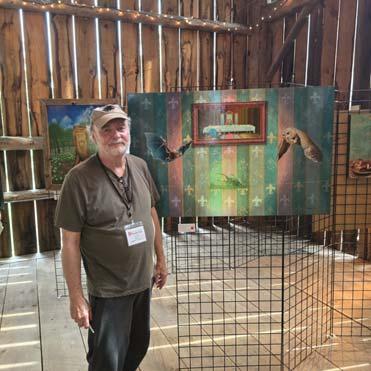
Bob Tunnoch, born in 1953 in Ottawa, is known to friends as Omar—or, in his own playful email sign-off, “Omartian, Rebel without a Planet.” He is not just a stunning Canadian-born surrealist painter but also a blues musician. A two-time Juno Award–winning songwriter and founder of the band Fathead, his music career is well documented elsewhere. You can look it up on Wiki later; they have the full story.
For me, I am interested in Bob Tunnoch the artist. Let’s get the pedestrian details out of the way first: he has been a member of the Society of Canadian Artists and the Colour and Form Society, and he is currently a member of the Ontario Society of Artists. He was a featured artist in the International Contemporary Artist publication (2013) and Arabella magazine’s 2021 issue as an “Artist to Collect.” He has won many awards, including the First Award of Excellence, Best in Show, at the Society of Artists International juried show.


He might at first appear to be a kind and calm farmer, but lurking behind his rural persona you would never guess he had the intellect and wit of a philosopher, quietly conjuring paintings with a complex understanding of life’s sometimes perilous juxtapositions. His unassuming demeanour suggests a life rooted in the mundane rhythms of country living, but behind that presence lies the mind of a true surrealist painter, following in the historic footsteps of Salvador Dalí (1904–1989) and René Magritte (1889–1967). His mind sparks with a thinking process as unpredictable as one of his dreamlike canvases. His use of vibrant colours, attention to detail, and surrealist subject matter leaves viewers stunned by juxtapositions that flirt with life and death. As you will witness in his paintings, he draws ingenious inspiration from the natural world. His superrealistic style is filled with meticulous detail and thought-provoking combinations of images.
Through works like “Sushi Roulette,” Tunnoch explores social commentary by presenting a blindfolded man, smiling from ear to ear, as he prepares to eat from bowls containing a flamboyant cuttlefish, a blue-ringed octopus, and a pufferfish. Each is beautiful in its own way, but each is lethally poisonous. Unlike Russian roulette, there is no blank chamber—every choice ensures a catastrophic result. With biting irony, Tunnoch satirizes humanity’s reckless consumer appetite and willful blindness, turning irresistible consumption into a fatal gamble with only one outcome. This work reminds us that consumerism, however alluring, can have perilous results if our indulgence is not exercised with care.

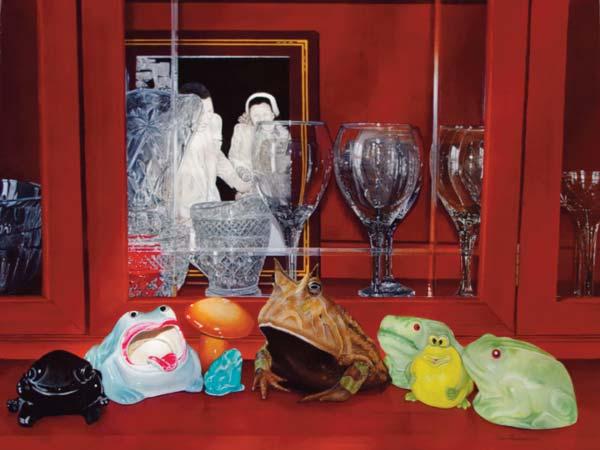
In a former life, decades ago, I was a corporate art consultant and would not have hesitated to advise any collector to add Tunnoch to their collection.
Thank you, Bob “Omar” Tunnoch, for brightening our world with your thought-provoking paintings.
You can find Omar at: www.bobomartunnoch.com

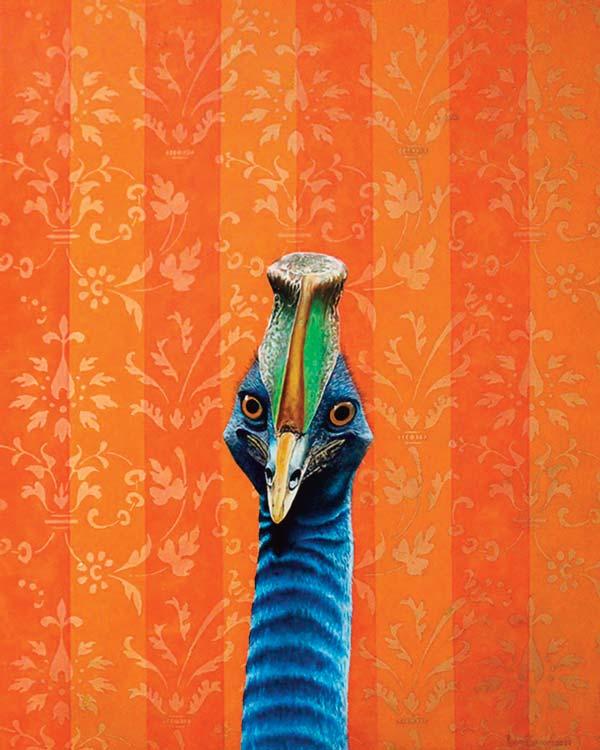


In Session, Carnivorous Plant Choir

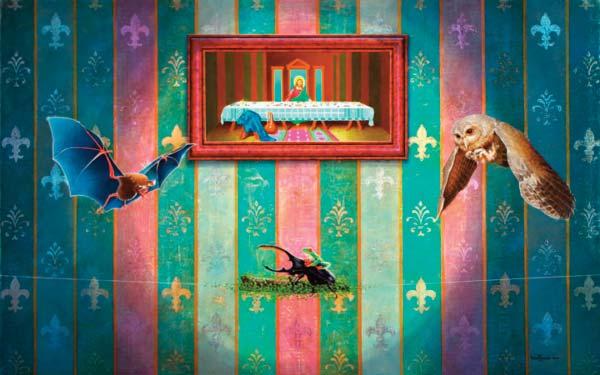
The Last Supper, Conflict of Interest

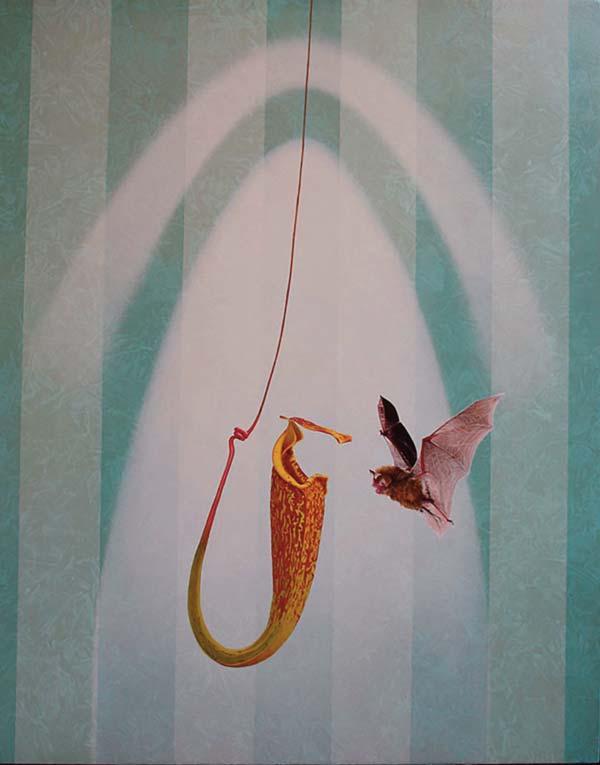
Prof. Miguel Ángel Olivé Iglesias. MSc
Author, Poet, Writer, Editor, Translator, Lit Essayist
General VP of the Canada Caribbean Literary Alliance
“I am grateful to have had the opportunity to write the poems that visit my desk and flow through my pen. I am simply a vessel, and I am thankful when the muses visit…” John B. Lee
How do I synthesise Canadian Poet Laureate John B. Lee’s oeuvre in a few pages? Lee’s writing gift has made him a recipient of as many awards as humanly possible. He has tirelessly crafted piece after piece in his long, prolific career. He has written nearly about everything with unique perspective and penmanship.
I have written some seven reviews about John B. Lee as a poet and as an editor too. I might write seven more in the years to come. What keeps me coming back to his work is his genius to take words and tame them and make them his own, almost as if he reinvented them, and then gently eased them onto the pages in tender, flowing sentences that mesmerize readers and reviewers like me. Whether the themes are the world


around him, his travels, family, friends, visits, sex and so on, we will always have the sentient writer (the man who is not a poet, just someone who writes poems, according to him) in constant exploring and strumming of the silence that he well knows “is the light the poem shadows from.” (from a poem by Lee)
His incursion in LitLand has left for us a fully detailed map of fine books with great poems for us to read, take in and become a part of their charm, one that appeals to us once we are caught up in their mystique. A note of advice: read twice; read three times if you have to but then you will be lit by that creatively red-hot furnace of words harmonically, essentially shaped into pieces we will not forget.
Roger Bell’s Foreword to John B. Lee’s formidable book This is How We See the World (Hidden Brook Press, 2017) illustrates further into the poet: “Wherever John Lee takes us… be it China, Thailand, Korea, Baffin Island… or the shores of our great lakes, readers will be aware of the archetype of his journey. Yes, the physical voyage has weight, but it is really the interior journey, the progress of the soul, that counts. While he so fluently details the world around him, Lee is more deeply in search of the ch´i, the vital force… something just beyond the circle of light.”

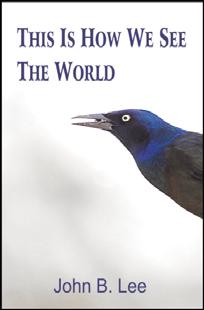

In my book When the Muses Visit: My Twenty Favourite John B. Lee Poems. An Annotated Selection (Wet Ink Books, 2024), I dared list poems I considered landmarks in my modest view. Poems such as How Beautiful We Are, I Wake to Breathe Your Beauty In, Kissing the Darkness when the Pages Close, I Too Can Show the Way, One Leaf in the Breath of the World, The Place Where Poets Pause, An Afterness, Taken, The Sad Mathematics of Our Lives and So, this is a place of places, reveal Lee’s rich, insightful poetic tessitura to enter realms from where he brings back the magic of letters. In doing so, he becomes
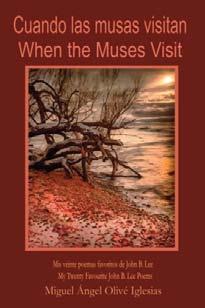
a magician of a higher order, a moulder and giver of meanings we never thought of, yet he unravels both worlds and meanings for us. The above titles alone—and a myriad of others—tell us of his broad thematic spectrum, as he covers love, poetry itself, a philosophical optic of things, his travelling recollections, fatherhood (read his section in Fathers & Sons by Richard (Tai) Grove, Don Gutteridge and John B. Lee. Black Moss Press, 2022), etc.
Precisely about his poems in the book I said: “I had the chance to read about John B. Lee’s feelings as a father. I remember his comments on the poem “The Sad Mathematics of our Lives” and what he said about his beloved son, “… my own experience as a young father carrying the precious bundle of my son in my arms, fallen asleep in the car, carried from car to house to be deposited in the cottage bed ... these images return to me... The sounds of the night, the shelter of my own loving arms cradling my child, the passage of time which cannot be held back…”
His impact rolls way beyond my humble favouritism. In my book In a Fragile Moment (Hidden Brook Press, 2020), I stated, “Lee keeps the language very much alive and holds it in his genius poet hands to pour out excellent products…” in reference to his poem Bread, Water, Love (John B. Lee’s chapter “Bread, Water, Love” from These Are the Words by George Elliott Clarke and John B. Lee (Hidden Brook Press, 2018).


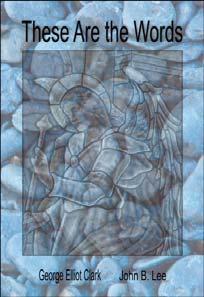
Another of his many books, Into a Land of Strangers (Mosaic Press, 2019), sings to family roots, life, sacrifice and honor. Lee takes words, touches them and – like King Midas turning things into gold – waxes them into indelible witnesses, and erects them as mementoes of events and lives past. Bernice Lever reminds us that “John B. Lee’s lines flow smoothly from one fresh metaphor to the next.” and Roger Bell says about him: “I encountered a writer of greater scope, and poetry even more profound and wide-ranging, than I

was accustomed to… John Lee’s wide and deep observations of this wondrous life… the gravitas he brings to his visions of this world.”
This is a digest of Lee’s work. Nonetheless, it would be incomplete without a brief approach to one of his latest books, Do Songbirds Know Where They’re Singing. Every book carries in its bosom—a word so aptly meaning “source of thoughts and emotions”—the experience, feelings, anecdotes and creative touch of the author. Do Songbirds Know Where They’re Singing, a 2025 Wet Ink Books fresh publication, is filled from cover to cover with a deep, strong, affecting, reverential aura only a few chosen can condense so intensely and pass on to the reader so effectively despite years elapsed. John B. Lee is one such poet. This is a book of poems memorialising the sequels of a war that devastated the human race and stole the lives of numberless soldiers, Canadians included.

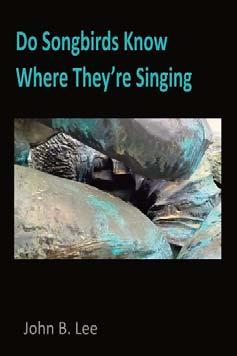
John B. Lee is not only a poet. He is an essayist, lecturer, professor, editor, thinker and humble human being. Regarding my review about his Into a Land of Strangers, a surprising anecdote made my day and led to the review. John B. Lee emailed me to ask if I was willing to write a review about a book he was about to publish. He said “I am wondering if you might be willing to review this book. If not, if you’re too busy, don’t worry about it at all.” A great poet asking a friend, so politely, so humbly, if I might be willing! Greatness and unpretentiousness in one man! Lee is every inch a modest man too despite his triumphant parade across LitLand.
The above example is proof of his modesty, and what we read in the lines and between the lines of Do Songbirds Know Where They’re Singing is evidence of his intention with the book and his profound sentience: “… a collection of homage to people he knew (his father-in-law, his Uncle) and closely related to, which adds a personal urge that will appeal to many, and to people, mostly and sadly young boys, who fought in the war and lost their lives. The poet’s sensitivity was aroused instantly by the atmosphere surrounding [a] gravesite he visited.” (Taken from my essay “Bird Songs of Tribute: I Remember… A Review on Do Songbirds Know Where They’re Singing by John B. Lee. Wet Ink Books. 2025).
Lee’s comments about life and writing, to mention two areas, leave significant material behind to ponder and reexamine the very nature of our world and lives. Existence and its labyrinths are a core vein in the poet’s construal of reality, a vein which he masterfully populates with poetry. About these motifs, Lee said, “I want, in poems… the spirit to surround and be surrounded by an interplay between the deep wells of the self and the stars beyond the farthest stars we might dream…” (Taken from John B. Lee’s essay “Even at the Worst of Times” in And Left a Place to Stand On, Hidden Brook Press, 2009).
Lee is a milestone in the rich mosaic of Canadian poetry, literature, culture, broadly viewed as human input and shaping of a heritage that is handed over from the past to us and will outlive this generation, next generations. Lee’s contribution and adherence to the long-standing tradition of celebrating nature – awesome, edifying, unavoidably present, whether we see it or not, whether we want to see it or not, is transcendental. No better remark to close my review than George Whipple’s calling John B. Lee “The greatest living poet in English.”
Thank you, John, for my few pages striving to enclose your huge contribution to CanLit.

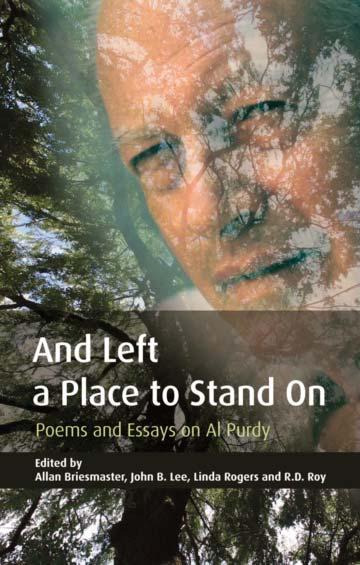

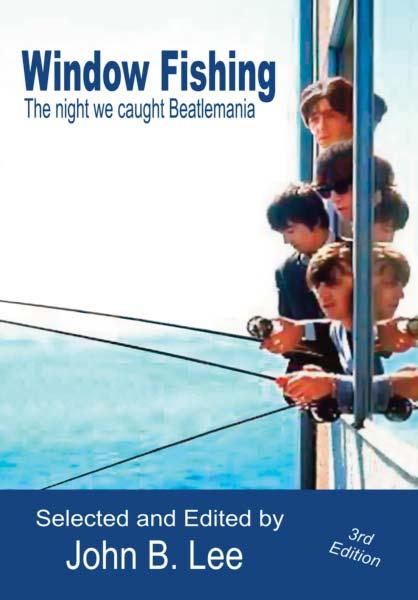
by James Deahl
Published
by Aeolus House
Review essay by Richard M. Grove (Tai)


James Deahl’s Four-Square Poems is quite a remarkable poetry collection, a republishing of four previously smaller books that bridges history, nature, and the complexities of human emotions. Each section of the book comprises long, interconnected poems that weave personal experiences, cultural heritage, and philosophical musings into a cohesive narrative. This analysis explores the four primary sections: In the Lost Horn’s Call, No Star Is Lost, North of Belleville, and last but not least, North Point and will hopefully bring the reader into a greater understanding of the CanLit voice of James Deahl.
Let me start by commenting on what I think is the significance of the dedication that James placed at the start of the book:
Although each of the four poems that comprise this volume is dedicated to a specific person, I would like to take the liberty of honouring my three wives:
Shirley Deahl
Gilda L. Mekler
Norma West Linder
May they have found peace and comfort in Heaven.
The dedication is deeply personal and I feel it serves as an emotional and philosophical framework for the entire collection. By honouring his three late wives; Shirley Deahl, Gilda L. Mekler, and Norma West Linder, James places the book as both a literary endeavor and a deeply reflective tribute to the most intimate three relationships of his life. The significance of this dedication can be analyzed through several lenses. It seems to me that James’ dedication is a profound acknowledgment of the central role these women played in his life and creative journey. By including them collectively in the dedication, he elevates the importance of their presence and influence on his life. The phrasing, “May they have found peace and comfort in Heaven,” reflects his grief and longing not just his hope for their eternal rest. This sentiment resonates throughout all four collections represented in the book. For example, in No Star Is Lost, the James reflects on eternal connections, saying, “Not so much grief, / but a recognition of limitation.” His acknowledgment of limitation mirrors the human struggle to accept loss while cherishing the enduring impact of love.
In No Star Is Lost, the love Deahl shares with Gilda Mekler is explored through lines like, “pure love endures forever,” emphasizing how love transcends physical existence. Similarly, in North Point, the wilderness he loves and the relationships he honours converge in metaphors like “a man lost in time” among trees shaped by the elements.
By dedicating the book to his three wives, Deahl invites readers to consider the complexities of relationships across time. The mention of all three women together suggests not just romantic love, but also a broader exploration of partnership, influence, and shared life experiences. This layered view of relationships is a recurring theme in In the Lost Horn’s Call, for instance, the poet reflects on misunderstandings and struggles, writing, “Ah, woman, slipping into nebula, you are bone,” an acknowledgment of both the ephemeral and the eternal nature of human connections.
Let me finish by saying that the dedication, therefore, might be thought of as a reminder of the imperfections and strengths in love, an undercurrent that enriches the emotional weight of the entire book. I hope it is not too much to conclude that the dedication is more than a ceremonial gesture but it is an emotional and philosophical cornerstone for the collection.
In the Lost Horn’s Call is the first section. It serves as a poignant opening to James’ book, reflecting on the social turbulence of the 1970s and the personal anguish that marked the poet’s own life during this period. Written during a time of gendered discord and societal uncertainty, Deahl’s imagery often oscillates between chaos and tranquility.
The opening lines:
The clarity of snow is cut by the thin edge of the land,
evoke stark imagery that mirrors the raw emotional landscapes explored in the section. The juxtaposition of nature’s beauty with human discord is a recurring motif, as seen in the poem “Toronto, 1976”, where the city is transformed into a “cosmology,” emphasizing humanity’s struggle to find harmony within urbanization.
From the poem entitled “One” James demonstrates his mastery of portraying the simplest perceptions in such a poetic way that one has to stop and be there. Many observers may have simply overlooked a leaf in motion.
imperceptible motions of leaf to sky to water
The finite resettling of light to lake proceeds downward along crevices of still air
In the distance the work of rock and time is a fragile passion
A few ducks rise among foamings at the ferry docks
In the poem entitled “Three” a particularly evocative moment is the observation of human relationships, captured in lines like:
She is Liberty striding over the dead.
James merges the personal and political, invoking historical figures like Delacroix’s Liberty while grounding the imagery in intimate, tactile moments.
The section No Star is Lost is dedicated to the late Gilda Mekler, his second wife. This section reflects on themes of love, loss, and memory, traversing landscapes both physical and metaphorical. The prologue introduces a contemplative tone reminding the reader that time is finite but anchored by the mystery of eternity. This philosophical perspective frames much of the narrative in No Star Is Lost
The section traverses specific geographies, such as the Appalachian Mountains and the coal-mining communities of West Virginia, where Deahl’s ancestral roots lie. In “Hiorra”, the poet explores the impermanence of human existence, using vivid imagery like:
bare trees showing the fallen house, to emphasize the passage of time and the erasure of once-vital lives.
Deahl’s treatment of the natural world is both reverent and even sorrowful. He acknowledges the harshness of nature, yet celebrates its resilience and capacity for renewal. The section’s title suggests an optimism rooted in the belief that nothing, whether a star or a memory, is ever truly lost.
Deahl is known for his long poems. “Camp Chapel” is a four page poem that blends nature, memory, and mortality into a meditation on time’s passage, where sorrow yields to beauty and remembrance.
But no star is lost, not even here where time and rain mark our losses.
Here is a perfect stanza to illustrate how Deahl deals with sorrow, beauty and remembrance:
Not so much a sadness, but a longing for forfeited innocence comes with the rain to these brown woods, comes in the quiet between rain drops. Not so much guilt, but regret, touches the heart like an unattainable lover or the hand of a childhood friend not seen for fifty years.
This section is a departure in form and tone, composed largely of haiku that capture the transient beauty of Canadian landscapes. Dedicated to Deahl’s grandson Felix Girard, the section reflects generational continuity and the cyclical nature of life.
Deahl’s haiku are steeped in imagery that celebrates the stark beauty of the Canadian Shield. For example:
Smoke from a highrise straight into frozen air— fields of bitter weeds.
This poem juxtaposes urban and rural settings, creating a dialogue between human encroachment and the timeless natural world.
The haiku’s brevity belies their depth, with each poem functioning as a meditation on existence, temporality, and the relationship between humanity and nature. The final haiku in this sequence:
Mississippi River frozen bank to bank— Orion strides across.
This simple haiku underscores the poet’s fascination with cosmic forces that mirror the vastness of the natural world.
Let me finish this section by quoting this haiku, in my mind the best of the batch. I have been there and heard that and felt it to the deep core.
Crack of noon cannon echoed by the bells of Pointe-Gatineau across grey water.
This section is dedicated to Norma West Linder whom I had the pleasure of meeting many times and published two of her books. The section pays homage to the Canadian wilderness and its symbolic resonance in shaping national identity. Inspired by Tom Thomson and the Group of Seven, Deahl uses vivid imagery to explore themes of resilience, transformation, and the search for a deeper understanding of self and country.
In “The Jack Pine”, Deahl draws on the iconic image of the lone pine shaped by wind and storm. The poem presents the jack pine as emblem and survivor, embodying resilience, stark beauty, and spiritual pilgrimage. Here are a few line:
Always a renegade pine shaped to wind and storm. This, then, is our station, our emblem and point of pilgrimage.
The jack pine, fireborn years ago when lightning flashed a forest into ash, waits at the border of water and stone —
Similarly, in “Burnt Country, Evening”, Deahl captures the regenerative power of nature, observing that:
Infernos burn, and as luck would have it, a painter records, and life returns without his help. Creation’s wild song echoes down the billions of years since that first fiery act of love.
This section’s centerpiece is “Algonquin Park”, a richly descriptive poem that likens the forest to a cathedral where “October’s flames soar.” Here, Deahl seamlessly blends sensual imagery with philosophical inquiry, asking:
In the quiet of dusk, one ponders the origin of evil. How could our separation from goodness arise? Can evil exist without us? Could cloud and lake have also fallen?
Deahl’s reverence for the land is tinged with an awareness of humanity’s flawed relationship with nature.
After reading these four books bound into one collection; Four-Square Poems, one has to simply say that Deahl’s style is characterized by both its linguistic richness and intellectual depth. His use of imagery is vividly vibrant as well as metaphorically descriptive but always accessible. For this James Deahl you go onto my list of top ten best living Canadian poets.

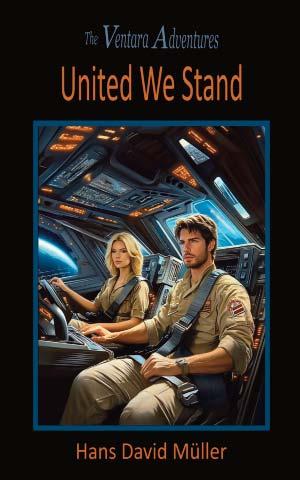
published by Wet Ink Books
Review essay by Brian T.W. Way
The hum of the Star Fire’s engines filled the cockpit with a soothing rhythm as Riz Talon adjusted the navigation controls. His sharp eyes scanned the glowing holographic map, tracing the edge of the Zetarian Empire’s territory—uncharted space for most Federation ships but familiar ground for the Galactic Trio. Outside, the vast expanse of the galaxy stretched endlessly, each star a silent witness to their daring missions. Kael Ventara leaned over Riz’s shoulder, his jaw tight. “Do we have confirmation on the meeting’s location?”
And so begins another dramatic chapter in this second volume of Hans David Müller’s YA fantasy series, The Ventara Adventures (the first novel in the series was The Resilience of Hope, this second, United We Stand). While independent of the first, this volume continues with the rollicking escapades of the previous tale’s Musketeers, the so-labelled ‘Galactic Trio’, Kael Ventara, Riz Talon and Mara Steeler, all ranked officers of the Galactic Federation as they war against the ubiquitous trickery and malevolent forces of the treacherous oligarch, Emperor Dominus Tiberius.
As a sub-genre of the Romance Novel, Science Fiction has its origins in the seventeenth century. While many earlier, even ancient texts from Gilgamesh to the Mahabharata, even the Holy Bible, imagine other-earthly domains with supernatural elements, the stage for Science Fiction was really set in the Age of Enlightenment with dual arrivals: the establishment of narrative prose fiction as a legitimate genre and the explosion of a scientific revolution in Astronomy, Mathematics and Physics. Kepler’s Somnium, Godwin’s The Man in the Moone and even Swift’s Gulliver’s Travels all vie for the prize as the first pure tale of Science Fiction, but Mary Shelley’s Frankenstein is, arguably, the true origin of the genre. There, scientist Viktor Frankenstein brings to life the new Prometheus, supernatural, alien, abandoned, cerebral, engaging the reader in a discourse that explores the very essence of what it means to be human, to be a creator, a parent, God. Afterwards, speculative writings by Jules Verne and H. G. Wells, Asimov and Clarke, Heinlein, Bradbury, Burroughs, Dick, Le Guin and many others emerge in every society, every culture. And in Space Odessey, Star Wars, Blade Runner, Star Trek, Alien and such, film and television popularized the genre even more. Whatever its cultural iterations or relative quality, Sci-Fi always remains intellectual in nature, with science, imagined or actual, with ideas and issues at its core, (and, of course, the human response to same). By the mid-twentieth century, it also spliced itself into fiction aimed at an adolescent market. Heinlein wrote a series of ‘Rocket Ship’ books for Scribner in the 1940s, a deluge of Bfilms aimed at teenagers filled matinee screens, and the likes of Tom Swift, Flash Gordon, and Buck Rogers blasted into print and celluloid. Like all innovative and enduring literature written for children, effective YA SciFi never condescends to its audience, always remaining both simple and complex, always inventing and reinventing folk story, legend and myth, always challenging the human imagination with the prospect of new ideas and old wisdoms (or lack thereof).
And with the U.S.S.R.’s launch of sputnik in the late 1950s, the ‘space race’ was initiated and Science Fiction seemed neither quite as fanciful nor as out-of-joint as once it did.
As a YA novel, Müller’s United We Stand is truly a sponge, absorbing, blending and occasionally manipulating aspects of the Sci-Fi canon from all directions of the fictional galaxy but, mostly, one senses, from that world envisioned across the silver screen. In its speed, armament and maneuverability, the slick battleship Star Fire is certainly a nod toward space-craft such as the Millenium Falcon, USS Enterprise or Battlestar Galactica; as with those spaceships, the Star Fire becomes a personified character in the fiction, alive and active: “High above Lumina, Riz led a squadron of fighters against the imperial fleet. The Star Fire darted through enemy lines, its sleek frame outmaneuvering
larger, more cumbersome ships.” The three principal heroes of the novel, Ventara, Talon and Steeler, like daring Jedi knights, engage their enemies with sword and blasters, certainly an echo of Star Wars’ many duels with lightsabers and blaster-pistols and, further back, the swashbuckling conflicts of Dumas’s eternal inseparables, Athos, Porthos and Aramis, although D’Artagnan, the principal protagonist of that classic novel, never materializes. Queen Anne, the Queen of France, (aka Princess Leia!) does, though, in the form of Princess Quann of Lumina, a determined champion of justice and hope. All of the protagonists are recognizable in act, deed and beliefs, the good promoting the ideals of freedom and fairness, the bad, such as Tiberius or Loanus (like the villainous Cardinal Richelieu or the archetypal Sith Lord Vader), seeking domination and control. The familiar mantra of The Three Musketeers is repeated numerous times throughout the book and becomes an overt theme of the novel. As Zane remarks in one of his speeches: “In the vast expanse of our galaxy, no world stands alone; each is a vital part of the cosmic whole. Together, we embrace the creed of ‘All for one, and one for all’.”
United We Stand dramatically offers most of the other aspects typical of YA Science Fiction. Space travel is a given, exploring strange new worlds, seeking out new life, going where no-one has gone before. From the desert landscapes of Duneara and the moon-scapes of Luna, the setting is partly embedded in Earth’s Solar System, and partly in distant alien worlds, in particular Quann’s home-world of Lumina where a clandestine espionage plot is underway auguring the rise of greater, darker conspiracies. This fusion of genres, in this case Science Fiction and the Spy-Thriller, is also often a feature of YA SciFi, often providing a complex arena in which the beliefs and values of the characters are tested. In this case, the Galactic Trio burrow into the villainous conspiracy, unwavering to their ideals. Structurally, the plot of United We Stand unfolds episodically, one dramatic event unwinding, then another, then another, a cinematic novel, frame by frame chattering through disparate scenes and adventures, robotic at times, but apropos, stylistically mimicking the kind of piecemeal text some AI program might write today. Its movement is also reminiscent of the classic cliff-hanger style employed in so many of the juvenile books of the 1940s and ‘50s, or even of the serial-matinees that ran Saturday after Saturday in movie theatres, dire, life-threatening events halting in mid-action to lure audiences back from week to week, then plunging forward into the story once again.
The characters in United We Stand fit comfortably, faithful to this
Romance genre, true, singular, unchanging, determined to follow whatever ‘force’ they have chosen for their life’s path—the good are good and the evil, notso-much. This is the singular, defined formula of Romance literature, staunch, unflinching caricatures, not soul-searching as much as belief-driving. Although Dumas’ Musketeers show difference (Athos is a drunk in a failed marriage, Porthos, a dandy, and Aramis, a womanizer), for the most part, like the ‘Galactic Trio and the triad from Star Wars, they are solid, one-dimensional and ever-true as if forever frozen in carbonite; similarly, the plot-lines are determined, predictable. Following this path, United We Stand leans toward the didactic often telling more than showing and always promoting a defined set of values. The views of its principal characters, those who conquer the villains of this galaxy, are iterated routinely, without doubt or hesitation—heroism, courage, honesty, friendship, loyalty, resolve. The reader is told about such values over and over. Speeches by Princess Quann, Ambassador Zane, General Thorne and others continually reinforce these creeds, and interlocutory epilogues between each chapter appear as brief moralistic poems, akin to propaganda posters that might have been glued to the worn brick walls of the 1960s’ Berlin where Müller grew up: for example, between Chapters 4 and 5:
When we stand united with new allies, our strength transcends boundaries, our resolve becomes unshakable, and no force in the galaxy can break the will of unity. Together, we are a force of unwavering determination, unstoppable in the face of any challenge.
And between Chapters 6 and 7:
All for one, and one for all, is more than a creed, it is a vow of unity and commitment. It calls us to stand together, fight as one, and lift each other up in every challenge we face no matter how big or small.
And between Chapters 7 and 8:
A house divided against itself is destined to crumble, for discord weakens its very foundation. Only through unity, trust, and a shared purpose can it endure. It is important to weed out dissention. Strength is found in unshaken unity.
In keeping with its visual style, illustrations enhance each chapter-heading—
stark, black-and-white, square-framed, like electronic wood-cuts, reminiscent of the kinds of decorative images often highlighting the pages in Tom Swift or The Hardy Boys. Even the portrait of the author (and his goat) seems in hyper-drive, slightly surrealistic, reminding one of the kind of refined ‘extrareal’ portraiture done by a writer/artist like Chris Van Allsburg. All of it somehow fits the whole, this arcane journey through the uncharted worlds of distant stars.
United We Stand promotes themes of trust and friendship hopefully relatable to young adult readers; the future it presents, though one hundred years beyond today, is still socially and politically recognizable through a present-day lens. Hitler is remembered for the evil he did, Gandhi for the good; Dumas and Donne for their literary works. The imagery and heroic tones of Romance, modernized in works like Star Wars, are maintained with minimal alteration. In keeping with this timbre, at the end the heroes are duly recognized by Admiral Thorne, once again reiterating the novel’s principal themes:
“Today, we honour the heroes who made this victory possible,” he began. His voice carried the weight of history. “The Galactic Trio and Princess Quann stood as beacons of hope in our darkest hour. Their courage and unity remind us of the power of standing together against tyranny. Let us welcome them now…”
Narrated as it is through an omniscient adult voice, United We Stand is not a YA fiction that explores many of the concerns typical to such fiction from a teenage point-of-view—identity, social justice, relationships, family, alienation—but remains fixed to its large thematic stars. Nor does it lean into satire, concerned with dystopian or technological or societal maladies. As with Star Wars, good and evil are defined and absolute and the universe is saved through the courageous acts of individuals and their sustained faith in an inviolable force.
So that’s Hans David Müller’s The Ventara Adventures: United We Stand space romance, espionage thriller, cinematic homage to those that have gone before. In the end, after long and dangerous battles, strategically fought and gallantly won, the Galactic Trio endures and the future is set on a better path.
Brian T. W. Way Poet, Novelist Retired Professor
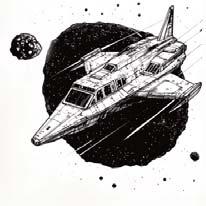





As a retired High School Principal and former English Teacher, I have no hesitation in recommending The Ventara Adventures: United We Stand or The Resilience of Hope to any high school English teacher to present in class. Both books are exciting, drug-free, and bad-language-free science fiction novels perfect for girls and boys of all ages. With brave, male and female relatable heroes, fast-paced action, and a message of unity and hope, both books are wholesome and thrilling at the same time. Readers of all ages will be swept into a galaxy of loyalty, friendship, and courage, making them ideal reads for families, classrooms, and young adventurers everywhere. They are engaging stories that uplift as much as they entertain. A perfect read for all ages.

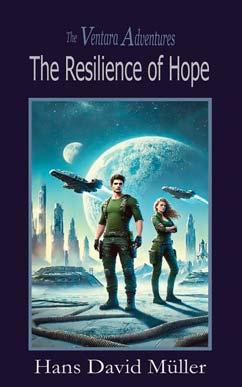
Review by Anna Mutala, Retired High School Principle
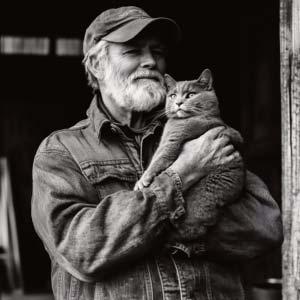

Hans David Müller was born and raised in Berlin, Germany. He was born in, 1960 and moved to a small town in Northern Ontario in 1982. With his unwavering supportive wife Christina, they raised three children; two boys and a girl. They raised two goats, a dog, two cats and a pet pig.
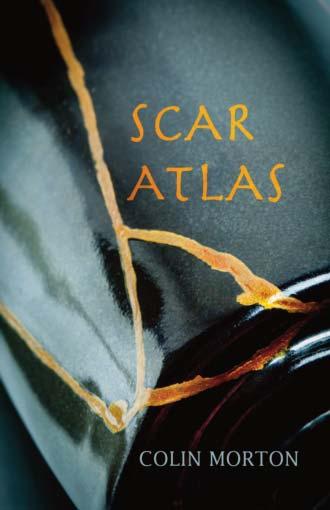

published by Aeolus House
Review Essay by Richard M. Grove
Colin Morton’s recent collection of poems, Scar Atlas, published by Aeolus House, is an engaging thoughtful collection that intricately weaves personal and collective history, exploring the scars left by war, time, and memory. Each section of this fine CanLit collection adds a different layer to Morton’s exploration, whether through the lens of familial trauma; technological alienation; or the meditations on mortality. Morton’s use of vivid imagery and carefully chosen language invites readers to reflect on their own scars—both visible and invisible—and the passage of time that inevitably leaves its mark on us all.
After writing the above short review I decided that this richly layered poetry collection deserves much more attention than those few words. Scar Atlas is divided into several sections that include; The Crawl, Scar Atlas, Up in the Air, and Crepuscule. Each of the four sections explores different facets of human experience, often drawing from personal reflection and broader social observations. Let’s break down each section to uncover its unique characteristics
and the thematic journey Morton takes readers on, while also comparing some of the poems within each section.
This opening section sets a somber tone by dealing with themes of history, war, and personal reckoning. The section begins with the poem, “Ghost Years”, where Morton reflects on the passage of time, haunted by “years adrift, where close friends went quiet, missing.” These ghosts are not only memories but also representations of forgotten history and personal disappointment.
In the poem “Long Slog”, Morton delves into the aftermath of the Iraq war and the SARS outbreak, noting how the personal and political collide. He revisits old feelings of helplessness, writing: “There’s no catharsis / and clearly nothing’s learned by looking back.” This mirrors the futility and cyclical nature of historical and political trauma, where the lessons of the past seem to have little effect on the present.
Morton’s poem “Politics” adds a wry commentary on political frustration, where an activist’s persistence never wanes, despite having little success. Lines like, “Your tell-all memoir failed to sell / but your ardour never wanes,” juxtapose passion with failure, offering a bittersweet reflection on activism’s limited reach.
The Crawl section highlights the grim, endless nature of personal and historical struggles, as Morton oscillates between personal reflection and larger societal critiques. By comparing the poem “Ghost Years” with “Politics”, we see a tension between introspective, haunted memories and outward attempts to change the world—a juxtaposition of the private and public self.
Scar Atlas
This section “Scar Atlas” dives deeper into personal history, often with a focus on familial ties and inherited trauma. The poem with the eponymous title, “Scar Atlas” is a poignant example, where Morton’s father becomes a symbol of war’s lingering scars, both physical and emotional. The lines, “I traced a route with my fingers on the map / of shrapnel scars that pitted his shins,” evoke a sense of intergenerational trauma and a son’s attempt to understand the invisible wounds carried by his father.
The first poem in this section, “Photographs of Me” contrasts with the poem “Scar Atlas” by offering a more introspective view of personal identity,
where Morton contemplates the different ways he has been captured in photographs throughout his life. He writes, “This one shows what I want the world to see. / It is the default picture / for a dozen facial recognition programs,” critiquing both the limitations of photography in capturing the full self and the surveillance state’s reduction of identity to data points.
The two poems, “The Wanderer” and “On Dead Man’s Flats” build on themes of isolation and dislocation, creating a haunting image of a person navigating a world where familiar landmarks no longer offer comfort. In “The Wanderer”, the speaker laments, “I go my own way / keep my counsel but / where is the sign to lead me home?” These lines emphasize the loneliness and existential uncertainty that pervades much of Morton’s work.
By comparing the poem “Scar Atlas” with “Photographs of Me”, we see a recurring theme of how people carry the past in different ways. While “Scar Atlas” focuses on physical scars, “Photographs of Me” reflects on the external projection of identity. Morton is concerned with the layers of self that are visible to others versus the ones that remain hidden.
This section turns its gaze toward the evolution of humanity and the modern technological world. In the poem “Footprints Laetoli”, Morton reflects on ancient human ancestors, noting how little we can infer about their lives from the physical traces they left behind. The lines, “We don’t know where she was going / or why on this day she walked alone,” highlight the sense of mystery and the unknowable past, echoing the earlier theme of history as a haunting presence.
Morton’s critique of modernity becomes more direct in “Junior Dictionary”, a poem that laments the erasure of nature from the language of the younger generation. “No more need for words like / beaver boar bullock cheetah,” he writes, pointing out how digital and technological terms have replaced words connected to the natural world.
In Morton’s poem “Dragon”, he portrays a boy who believes he can transform through choosing new parts. “He has drawn up plans on an index card / for a Body Parts Exchange. / / Choose horns or tail, a fly’s / compound eye or lizard skin. / / Claws, wings, scales, and fiery breath: / with these, he thinks, he’ll come into his own.” The poem is a wonderful meditation on identity and modern desires for reinvention, but also serves as a warning about the detachment from human nature in the pursuit of fantasy.
By comparing “Junior Dictionary” and “Dragon”, we see a tension between loss and reinvention. While the former is mournful about the fading of natural connection, the latter explores how modernity allows for the creation of new, albeit artificial, identities.
The final section, “Crepuscule”, marks a contemplative reflection on aging, mortality, and the end of things. The title poem “Crepuscule” uses a villanelle structure to echo the repetitive cycles of life and aging. Morton writes, “Pacemaker beta blocker titanium knee. / We’re kept in comfort at great expense.” The poem juxtaposes the advancements in medical technology that prolong life with the inevitability of death.
The poem “Amnesia” presents a more poignant reflection on the fragility of memory, where Morton illustrates the uncertainty that comes with aging: “One day a surgeon / in the midst of a procedure he’s performed many times / loses the moment and snaps at the nurse.” This poem, like many others in the section, reminds the reader of the gradual erosion of identity and the ways in which memory—both personal and collective—slips away.
In contrast Morton’s poignant poem, “Visitation” he finds solace in the presence of friends, both living and deceased. The speaker visits memories as if they were still ongoing conversations: “Not all my friends are living and often / it’s the others I visit.” The poem suggests a blurring of the lines between the living and the dead, offering a sense of continuity even as the end of life approaches. Enjoy these line, “If you feel that way too, you’re welcome / to visit me when I’m gone.” I thought that I was the only one that visited those who have already passed on.
By comparing “Crepuscule” and “Visitation”, we see Morton grappling with different aspects of mortality: one through the lens of bodily decay, the other through memory and relationships. While “Crepuscule” underscores the physical limitations of aging, “Visitation” emphasizes the enduring emotional and mental connections that can transcend death.
Dear Reader, you won’t be disappointed if you add this book to your CanLit collection.
Happy Reading.
Prose Curator – Brian Moore


Brian Moore lives in Toronto where he worked as a project manager in the financial services industry. He has been writing prose for 6 years and has had over a dozen stories published internationally in periodicals such as Blank Spaces, The Barren, October Hill, and Event
Dear Readers:
I was fortunate to read an earlier draft of Mathea’s story before she submitted the finished product. The change in complexity and depth between the early and final versions was startling. Excellent writers are never satisfied. They search for the best words, not any words, to breathe a story to life. Heights steps away from stereotypes, asking, why do we sometimes sabotage ourselves? Why do we linger in relationships where we hurt each other? Mathea avoids easy answers. That’s what makes this story both special and wise.
Brian Moore Prose Editor
I awake with a start. The air hangs about me a pallid, smoky shroud, and I can hear the distant tinkling of bells. The walls are orange and chipped, the bed frame aged wicker. I raise my hand to feel my forehead – a vestigial habit from years of waking up to count acne bumps on teenage skin – and find a hard ridge there. I can’t feel my finger on it, realize it is a bandage. I do not feel any pain. Where I ought to feel dread there is a strange emptiness; a groggy calm seeps through my veins. I am safe here. But where is here? In space: a Himalayan mountain lodge. In time: the peace that follows the fall. Somehow, I know this.
Our first date: we sip coffees from Almond Butterfly Café on Dundas Street, and I make a joke about the disappointment inherent in gluten free baked goods. (Six years later, I would be diagnosed with stress-induced celiac disease). Henry wears a wrinkled white button down and has a poppy seed stuck to his tooth and I like him right away: the gorgeous imperfection of him. His parents own a cottage in Muskoka and invite complete strangers home for Christmas, he tells me. They see life as a collection of interesting anecdotes. I wonder if I’ve been interesting enough so far, what his parents would think of me. I’ve never thought about meeting parents on the first date, am surprised and mildly disgusted with myself. After leaving the coffee shop, we zig-zag up and down residential streets, drawing the date out as long as can seem casual. When Henry spots a squirrel with an albino tail, his hand pounces on mine with excitement. I decide to become his girlfriend.
My little orange room is snug, but I can’t stay in here forever. The walls are thin, and I smell curried lentils at their seams. It is cloying, and I am vaguely aware of being tired of this particular flavor. But if you really like something, can you tire of it? And where is Henry? I feel a pang in my chest, like I ought to know. He’ll be pissed that we got separated, probably blame me. You’re always looking for something better, I hear him rattle in my head.
A knock at the door. Dinner is ready. The voice gentle, sympathetic. Where the fuck is Henry? Panic rushes in, stronger than the calm but just as deathly quiet. I leave the room that isn’t mine.
It is pale August, and a light breeze billows past my bedroom curtains. I’m sitting on the bed I share with Henry, writing a list of things I want this year. Autumn has always seemed the beginning of the year; I never quite shook the crisp indulgence of going back to school. The list:
To be engaged to Henry
To learn to paint with watercolors
To adopt an old, sad cat whom nobody wants (It all comes true.)
It’s coming back to me. Henry wanted to go on an adventure. He knew a guy who knew a guy who owned a trekking outfit in Nepal, and we booked flights. Henry had been morose lately, and I wanted to please him. Not all the way up Everest, he assured my parents with a wink during one of our visits. Just a taster session. See if it’s for us. I smiled and nodded, already knowing it wasn’t for me. But Henry was – is – for me. The curry is mild. There are other travelers at the large cafeteria-style tables, whose curious eyes brush my bare neck, sticky with sleep. One of them looks vaguely like an American movie star.
My eyelids are hot and oily and my cheeks sting. A middle-aged woman takes my plate, places her hand on my shoulder, lowers her voice to a murmur. Namaste, she says, her eyes narrowed to crinkles. It won’t be long now.
The ice over Skeleton Lake is cracking, and I’m drinking a cup of tea with my mother-in-law, both of us wrapped head-to-chin in pendleton blankets. We sit on the sectional facing the water, our reflections peeking back at us as evening falls. Silver-haired Deanna flips through a Nepalese guidebook, reading out passages about the “awe-inspiring wonder and beauty of the Himalayan region and people.” I wonder how an entire people would feel about being labeled as such, but say nothing. We laugh together about Henry’s adventurous spirit, and how a trip like this was always inevitable. How Henry will let me get a cat if I let him climb his mountain. Deanna pratters on:
Have you heard about the Sherpa widows? My friend Barbara went to Base Camp and said that nearly every woman she met in the mountains had the same
empty, haunted look in her eyes. It’s because every woman there has lost someone to the mountain. They’ve all lost a man. They call her Chomolungma –Everest. I saw this amazing programme about two widows who went and broke all these expectations by actually climbing Everest. Incredible. Really. Not just because of the physical danger but because you’re meant to be sad forever, like Queen Victoria. I took a class on Victorian history once: fascinating. Dark and gray and colorless, that was the expectation. Brooches filled with dusty old hair. But the women in the documentary wore magenta and told jokes.
The setting sun traces an orange glow along already-orange walls, and I find myself thinking about Bert. Is Michelle, the neighbor, remembering to feed her? Is she dealing with the medication correctly, under the tongue? Bert’s tongue is rough like sandpaper. If I lay my palm along her back while she grooms, her tongue slips over my hand as if she isn’t sure where her fur ends and my skin begins. Bert is a cat, and will need careful tending to. Bert is old and fragile. Some cruel people removed her claws once. Bert might be struggling with the lack of routine.
Without Henry around, Bert will not have to deal with any interruptions to her sleep; cats need twelve hours per day. I take immense pride in my status as the owner of a cat with special needs.
What made being with Henry so good was that I shouldn’t have been with him at all. Henry turned me into a child, made me kick my legs and swing my arms. Sometimes this was wonderful. A Sunday afternoon in the park, Henry pushing me on the swings. Cotton clouds and a breeze smelling of lavender detergent, a little girl walking over to us to tell me I’m pretty. Throwing socks at each other while folding laundry. The sting of one thrown just a little too hard. Bruises in unexpected places. My mother always told me that love was like childhood: creative and unselfconscious. Henry and I embodied that. But what my mother never told me was that children spit, kick – they are spiteful, violent little creatures. And love made Henry this way, too.
Strangely, it wasn’t the violence that bothered me as much as the possibility of falling into an old, tired narrative. Young Woman Finds Out Wonderful Young Husband (Works In Finance) Is Actually A Sociopath. So I kicked back.
Never wanting to be a victim, I picked fights to prove to myself that I wasn’t afraid to have them.
One Saturday night, over too much wine at a friend’s housewarming party, I flirted brazenly with a shaggy-haired drummer while Henry got cozy with the cheese fondue. When Henry saw the strange hand on the small of my back, I knew I would wake up with a bruise the next morning. But it was my curation. As long as I could control my story, I never felt weak. I was a willing participant in my toxic love affair. Whenever Henry’s frustration neared its boiling point, I turned up the heat.
Things with Henry were spinning out of control around the time I went to the local SPCA branch and adopted Bert: the old, sad cat whom nobody wanted. I’m not even sure that I particularly wanted Bert, though I grew to love her, but I so desperately needed to care for something. Bert lay like a crumpled tissue at the back of her cage, her fur tired and off-white. The little chalkboard hung on her door read: Bertha, 10, diabetes. She proffered a look of indifference, as if she didn’t dare let it cross her feline mind that I might be her ticket out of there. That night, Bert dozed on our immaculate sofa knowing full well she was set for life. Until Henry found her.
A white woman wearing a gauzy dress and a sequined turban hands me a moist towelette. For your forehead, dear, she coos. Around me are a congregation of women on some kind of empowerment trip; the little placard on their table reads Big Uterus Energy, Reservation. If it wasn’t obvious before, I understand now that I am an object of pity at this altitude. Henry isn’t here, and he’s meant to be, or I’m not meant to be, and now every woman wants to be my mother. Henry is dead, and I probably killed him.
It’s the Sunday morning after I adopted Bert, and I’m cuddling her beside the picture window. Bert peered in at me through that window last night, eyes wide as saucers. Today, frost puckers at the glass. For two hours Bert waited, believing she’d been cast aside by her new family. A simple thing: to open a door the wrong way to a pleading cat. But somehow more violent, more cruel, than to elbow me in the ribs or strike my cheek aubergine. Henry heard Bert pleading for death and tried to answer her call. At least that’s how it seems to me right now, as I bury
my chin in her matted fur, tears filling my eyes. Across the room Henry stares at the floor, unable to meet my eyes.
I wasn’t thinking straight, I’d had a couple drinks and she wouldn’t stop meowing. I just wanted the noise to stop, so I opened the door. Sorry, I know it’s bad, I’m trying to calm down. It’s this medication, probably, makes me so angry all the time. I’d never hurt the cat for real. I was right there the whole time ready to let her back inside. Listen, no listen, listen to me right now, listen. I like the cat, I also wanted the cat. I don’t care. Why do you hate me? Why do you pick fights all the time? Why do you try to make me mad? You’re not helping me get better. This is on you, too.
I am carried down the mountain on the back of a stout brown mule, clementine scarves floating around my neck. At each tea house we pass, another woman gazes sympathetically into my eyes and adds a piece of thin fabric to my collection, bowing her head as if to induct me into the society of widowhood. I always imagined widowhood would smell like mothballs or church incense. Instead, as our convoy crests a hill, I sniff the air and it smells like yesterday’s rain.
When we reach the last teahouse before Lukla, gateway to the Everest region, my mind has cleared enough to begin imagining the kind of life that awaits me in Canada. Bert and I will move, not because we have to but because we can. I’ll wear stained coveralls while I paint the walls a crisp off-white. Maybe become the kind of person who paints an accent wall in the kitchen. I’ll take adult ballet classes and spend thanksgivings at Skeleton Lake, helping to keep Henry’s memory alive. I’ll nobly allow Deanna to flip through an old photo album, look away and take a deep breath when it all becomes too much. I’ll make a watercolour rendering of our wedding photo and display it on the mantel: the perfect snapshot of a young marriage cut tragically short.
When Henry walks into the teahouse in Lukla I feel for my bandage, realize it is peeling, its edges caked with dirt.
Henry’s words pounce at me: Babe, I can’t believe you actually left. How was your trip down? Why are you still wearing a bandage on that cut? It was just a little fall. You didn’t have to descend by yourself, honey. The view from the top was worth it. I felt like a god. I missed you so much.
Henry kisses me where the skin is starting to heal, leaving a throb and a line of saliva. A flash of remembering, a brief negotiation with loose rocks underfoot, the sharp shame of arms flailing. Somewhere in my ear’s memory is a yell, mine, sudden and pleading.
As the plane to Kathmandu takes off, I imagine a group of women laughing below, magenta scarves winking at me. Henry watches a movie, his arm dead weight atop my own. I am taken aback by a lump of longing in my throat.
Henry? I ask, my reflection in the window daring me to go on.
It’s over. That was the last time.
Mathea Treslan matheatreslan1@gmail.com Toronto, Ontario
Mathea grew up in Owen Sound, Ontario, before leaving to study English and International Relations at the University of Toronto. She then earned her PGCE at the University of Oxford, and now works as a teacher. Mathea started writing short fiction in high school, and has since had her work published in a variety of publications, including short stories in Goose Fiction, poetry in Mnerva, and a personal essay in The Globe and Mail.


Do you have a story to tell? Devour is now seeking prose for future issues from Canadian writers. We are looking for vivid, thoughtful writing that shows your love for characters and words.
Submission guidelines:
– previously unpublished work only.
– no more than 3,000 words.
– only one submission per author per six months.
– no content created by artificial intelligence.
– send one attachment only as a .doc, .docx, .rtf, or .txt only – no pdf files.
– include your full author name, your city, province and email address in the body of the file above your story.
– include your 100 word bio below the story text in your one attachment.
– enter the genre and title of your submission in the subject line of your email. Example: Fiction: My Story Title.
We are considering the publication of a short story anthology. If your submission is not used in Devour it will be considered for the future book.
Send your Prose Submission to: Brian Moore – moorebhere@gmail.com
Wet Ink Books welcomes submissions of full finished manuscripts by Canadian authors of: Memoirs, Novels, Short Stories, Novellas and Poetry.
Do not send your ms. Send enquiry emails only with a 100 word synopses of your book. Include your name, email address and city of residence in the body of the email.
WetInkBooks@gmail.com
